Niche Keyword Research: How to Find Low Competition Keywords and Win in the SERPs

When you buy something through one of the links on our site, we may earn an affiliate commission.
Niche keyword research helps your site become profitable. It is an extremely important skill when it comes to writing content for your blog or website and then ultimately ranking in Google.
Understanding which keywords you should target based on your sites current authority in the niche is one of the most important skills you can acquire when it comes to building websites for SEO.
It's what you need to rank in the top 10 organic results of Google when choosing niche keywords.
But it takes time to learn and usually trial and error. And that's why we created this article. To save you the headache of spending your precious time and money (if you outsource to content writing services) going after the wrong niche keywords.
Bar none, picking keywords that are too difficult to rank for is the #1 reason why websites fail.
But when it comes down to it, I believe that effective niche site keyword research can be boiled down to 2 main concepts:
- Ability to Analyze the Top 10 organic competitors in Google to not only gauge the competition but also identify the (often) changing keyword intent
- Discipline to target low competition keywords (instead of high search volume/high competition).
Unfortunately, most people just do not have the ability to effectively analyze the top 10 organic search results in Google AND/OR do not have the discipline to only go after low competition keywords.
So, I'm going to shed some light on how you can effectively analyze how difficult the top 10 organic search results in Google are for your keyword.
Then share some important tips on niche keyword research tools (both free and premium) that will help you on your journey. And by the time you've finished reading this article, you'll know how to do niche keyword research like a pro.
That way you can build a blog or website the right way and start ranking for your chosen search terms sooner rather than later.
Contents
What Is Niche Keyword Research And Why Does It Matter?
Think of keyword research like throwing wet spaghetti at a target vs. throwing a dart at a target. If you write about whatever topic you feel like writing that day, it's kinda like throwing a bunch of spaghetti at the wall.
Some of your content might “stick,” but odds are that most of it is just going to fall to the ground and eventually swept into the trash.
But, if you focus your content based on keyword research, it's more like throwing a dart at a target. You are much more likely to have your dart hit the target and stay there.
Sure, there is no guarantee, but your odds of getting traffic are SIGNIFICANTLY better.
Conducting niche keyword research will help you find keyword ideas and specific keywords with the most potential. So that when you write content, you'll eventually rank at the top of the organic search results.
This will dramatically improve your odds of getting that coveted that sweet free traffic from ranking high in the Google SERPs.
This type of in depth look at keywords also helps you better understand your audience and find relevant keywords for topics your audience wants to know.
Niche keyword research helps in the the exact same way that doing market research helps any business in the world.
Long Tail Keywords vs. Head Terms
Throughout this guide you are going to hear me refer to “long tail keywords” and “head” search terms. For simplicity sake, we can refer to “head” terms as those higher monthly search volume and typically more competitive keywords.
A long tail keyword is one that typically has lower search volume but is also much easier to rank for.
Please note that a long tail keyword doesn't mean it's necessarily a longer keyword phrase.
The “long tail” is actually referring to where it resides on the search graph.
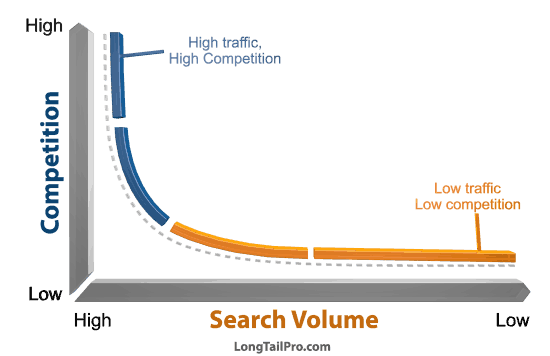
As you can see, from the graph those keywords that fall on the right of the graph (orange) are considered the long tail keywords. Those potential keywords have low volume and low competition.
While those keywords on the left of the graph are the head terms.
When doing keyword research, focus on the long tail keywords! The odds that your website will rank for head terms is very low, especially if your website is newer.
However, the beauty of the long tail is that not only is it easier to rank for these search terms but, in aggregate, there is more traffic in the long tail than head terms.
In other words, more people in aggregate search for long tail keywords than they do for head terms.
Finally, if you have a truly optimized page, you can start by ranking for long tail search keywords, but over time you might ALSO rank for the head term.
For example, I am targeting the long tail keyword of “best online business to start.” As you can see from the screenshot below, I currently rank near the top of Google for that phrase:
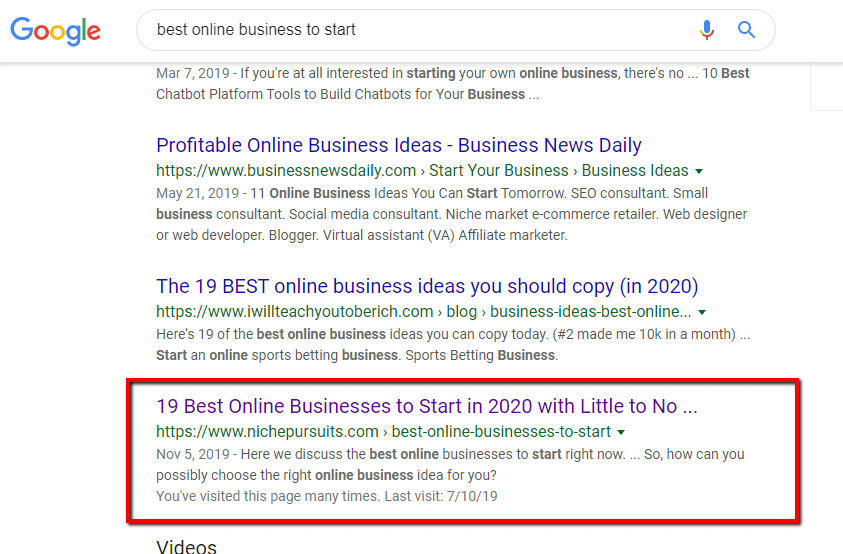
However, I also have started to rank on either page 1 or page 2 of Google for the term “online business” (a head term I wasn't directly targeting):
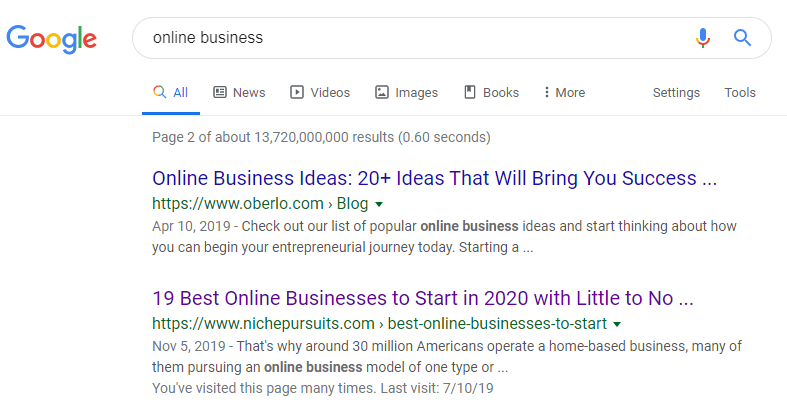
The bottom line is that I can tell you from experience, you will have much more success with your keyword research results if you target long tail keywords. It just takes discipline to not get “tempted” by the high monthly search volume head terms that show up among the keyword suggestions of your favorite keyword research tool.
How To Perform Niche Keyword Research
I'll assume that you've already selected a great niche market and possibly have an existing website. However, when it comes to adding content to your website it's vital for affiliate marketers or anyone else that you select a subject that you can actually show up for in Google.
So, how should you go about finding keywords for your website that you know your site can rank easily for?
I'm going to cover 6 steps you need to follow in order to maximize the returns on your keyword research time investment.
- You need to brainstorm for seed keywords.
- You're going to use these seed keywords to find related long tail keywords.
- Use keyword modifiers to uncover “hidden gem” keywords that are easy to rank for.
- Analyze the difficulty of ranking on the first page of Google for those search keywords.
- Free niche keyword research tools to use (like Google Keyword Planner).
- Premium niche keyword research tools to use.
Let's look at each of these points in depth.
Step #1: Brainstorm For Seed Keywords
Think of keyword research as a large funnel. We need to first start broad, with general keyword ideas. This is the brainstorm phase.
After we have figured out the types broad “seed” keywords that we want to target, we will filter those down to the bottom of the funnel where eventually you'll get to find relevant keywords you actually want to target.
In other words, don't target these “head” terms we discover in step one. We want to drill down for the hidden gem long tail keywords in a minute.
But first, we need to start at the top of the keyword research funnel.
Here's a list of several ways that you can start finding broad or seed keyword phrases in your niche:
- General brainstorm. Just grab a piece of paper or a whiteboard and start writing down all the words or phrases that come to mind for your particular niche.
- Look at ads. Search Google for some of the terms from your general brainstorm. See who and what is being advertised. Write down the additional products, phrases, and ideas that come from these ads. Lots of good ideas here!
- Go Shopping. Depending on your niche, you might be able to walk down the isle of a department store and see tons of products, brands, or other phrases that you wouldn't have thought of otherwise.
- Use Amazon Products, Categories, Descriptions, and best sellers. Amazon has millions of items, and hence millions of root keyword items. Don’t just look at product names, also use categories and the words you see within the descriptions to spark new ideas. To see the top selling items, browse through the Amazon bestsellers of all the categories.
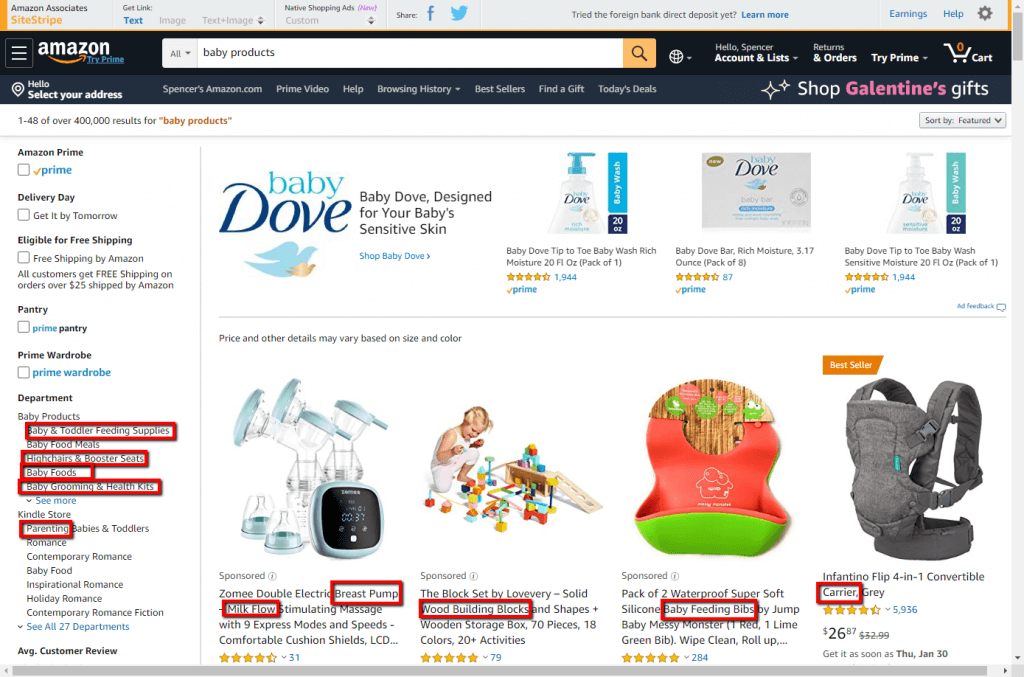
- Use eBay Products and Categories. Some concept as with Amazon up above.
- Use Affiliate Networks. If you are stuck for ideas, simply log into any number of affiliate networks and browse the products and READ the other keywords that are used in descriptions of those products.
- Go to the Library. Check out a book or two in your niche and you'll likely come across thousands of seed keyword ideas and LSI keyword ideas you can use.
- Try Wikipedia. Don't be afraid to go down the rabbit hole of Wikipedia keyword ideas a bit. Wikipedia makes it easier than ever for affiliate marketers to find similar topics with all the references.
Tons of Seed Keyword Ideas on Wikipedia - Read Forums
Keyword Ideas on Forums - “Steal” ideas from other websites. Find your competitors in the niche and see what topics they are writing about and ranking for. Best part? Competitor research is totally legal and actually necessary! As long as you write your own unique content on the similar idea. Never plagiarize!
Let imagine you in the Mom blog space and you are considering writing about products for babies. One great way to find lots of seed keyword ideas is to visit some of your competitors websites and see what types of categories and keywords that they are using.
Here's one example of a website is the baby gear space:
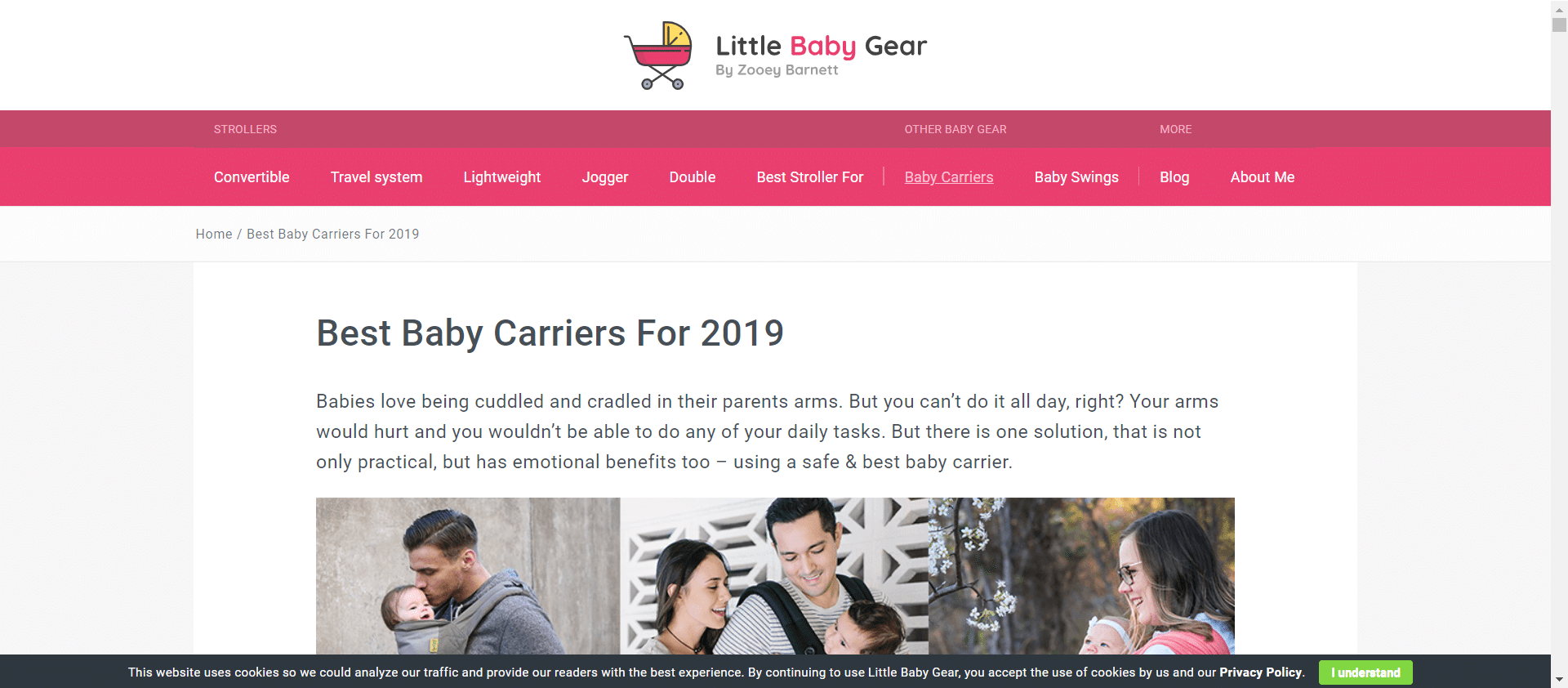
And now we're going to use this website to get some seed keywords.
And there is a motherload:
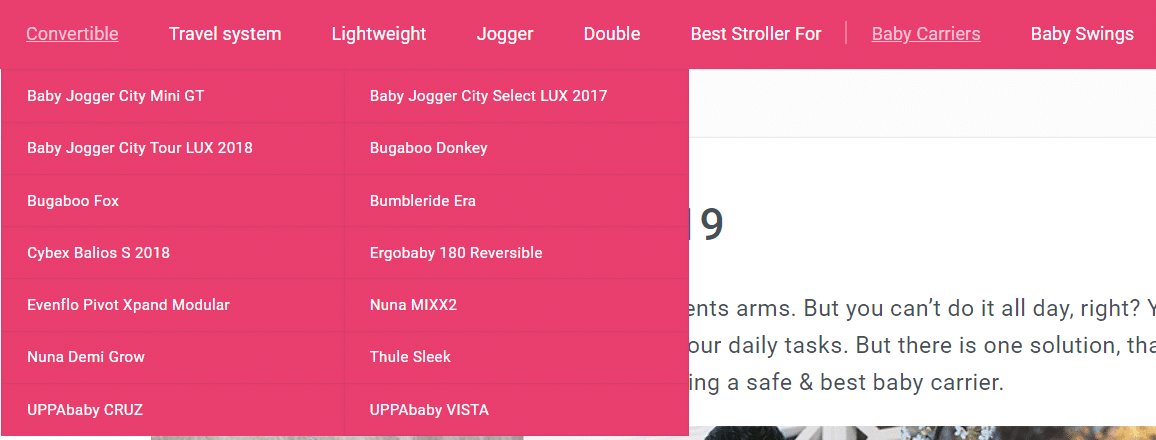
We don't need to use all of these, just a few.
And you can repeat this step for as many websites as you like. You can click on the first 3 results or search for a ton of keyword ideas.
Now that you know how to brainstorm (in lots of different ways), it's time to put your keyword list to use.
Step #2: Use Seed Keywords To Find Related Niche Keywords
Now that you have a list of seed keywords, it's time to expand those keywords into a larger list of related keyword ideas. You can quickly generate hundreds of related keywords by using a keyword research tool, or several of them.
However, remember that just because you get a list of hundreds or even thousands of keywords doesn't mean you want to target all of them.
We will discuss how to further filter your list down using modifiers and analyzing the first page of Google.
But first we need to expand our seed keywords into a larger list.
The best way to expand your seed keywords list is to use niche keyword research tools. I'll be using Long Tail Pro. (But I'll show later on several other great tools that you can use as well).
I grabbed some keywords from the site I shared above, related to baby carriers and strollers, and here are just a few of the suggestions I get back:
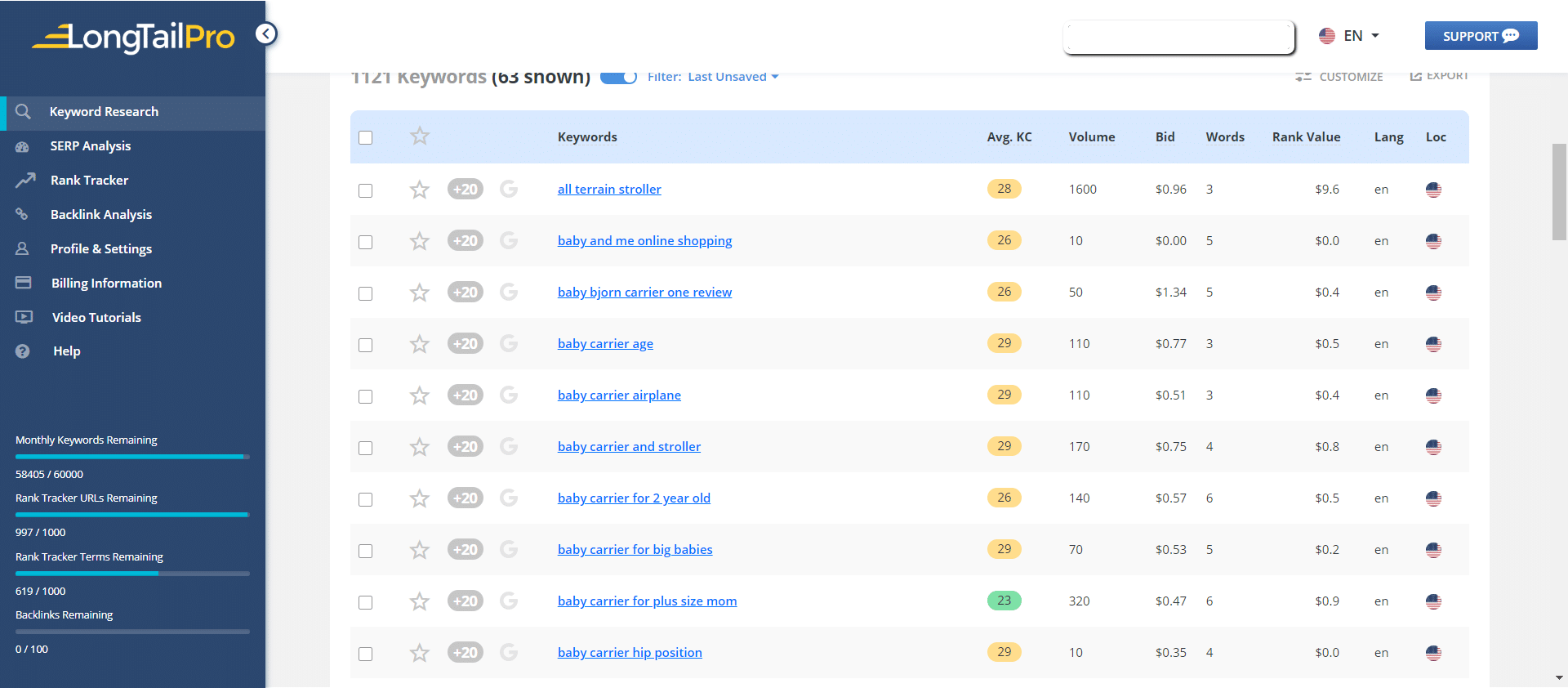
I got back a total of almost 1,200. This is obviously WAY too many to target. So which one do you choose?
I will be sharing exactly how to find the lower competition keywords (ie. the long tail keywords) in the next section.
You can repeat this process as long as you want: think of an idea (like baby carriers, couches, fishing poles). Use that idea as your seed keyword or search it on Google to find more seed keywords.
If you want a free keyword research tool, you should also consider using the Google Keyword Planner tool.
The keyword research tool by Google will give you the monthly search volume and also lots of additional keyword ideas for SEO and PPC campaigns.
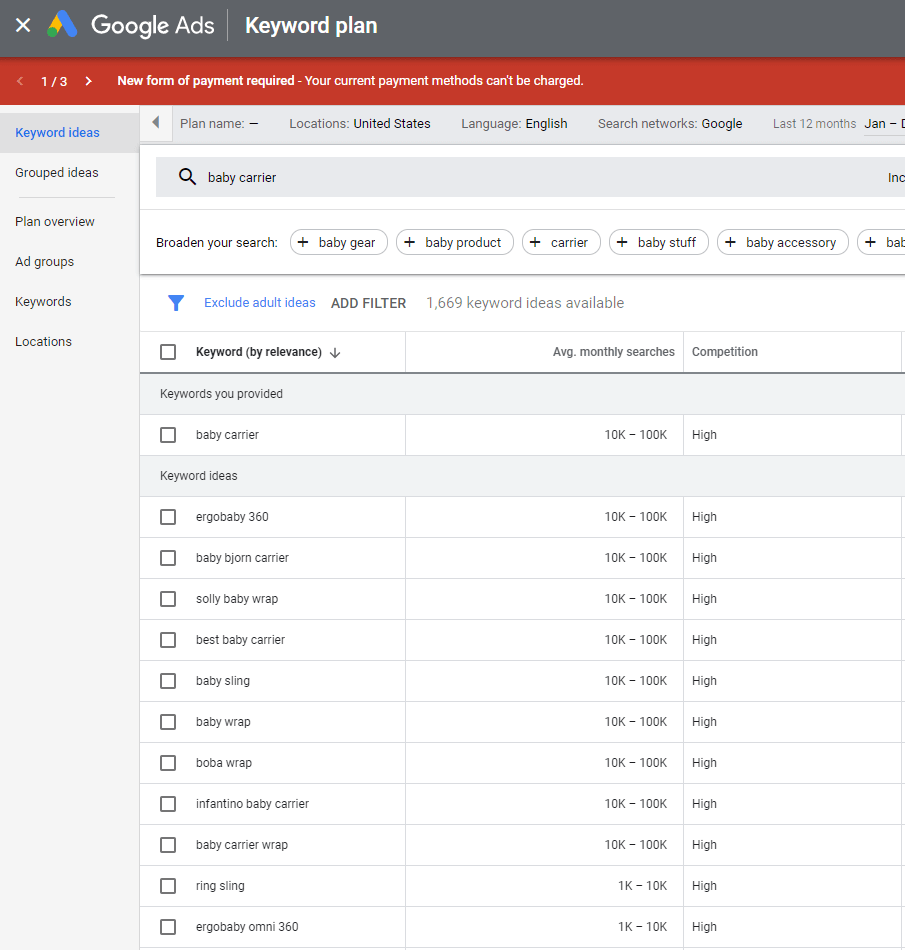
The Google keyword planner was created for paid advertisers (advertisers looking for keywords they should target for ads), but you can also use Google keyword planner for SEO purposes.
Step #4: Use Niche Keyword Modifiers to Find Low Competition Keywords
Using keywords tools like Long Tail Pro and the Google Keyword Planner can definitely help you uncover some great keyword ideas. However, these tools will sometimes miss some great opportunities.
That's where keyword modifiers come into play.
These are more advanced strategies that you can expand you seed keywords using certain word “formulas.”
These formulas or modifiers regularly uncover low competition keywords that are easy to rank for.
I have used these modifiers hundreds of times to rank my articles for highly valuable keywords. And you can, too.
Keyword Modifiers to Consider
Fill in the Blanks with your niche/keywords
- Best _________ _________ (Example, “Best Survival Knife”)
- _________ ________ Reviews (“Survival Knife Reviews”)
- ________ vs. _________ (“Gerber vs. Kabar”)
- Best ________ Brands (Best Knife Brands)
- Where to Buy _______ (Where to buy a survival knife)
- _______ Under $________ (Survival Knife under $100)
- _______ alternatives (Gerber alternatives)
Don't under-estimate the power of these keyword modifiers! You can quickly turn a “so-so” keyword into a keyword that is really easy to rank for and is also a high buyer intent keyword.
Step #5: Analyze the First Page of Google for Your Keyword
Now that you have some potential keywords from either the niche keyword research tools you've used or the keyword modifiers, you now need to TRULY determine how easy that particular keyword is to rank in Google.
This is the great filtering process that I've been referring to. You've found seed keywords, you've expanded that list, and now it's time to filter it down until only the winning keywords are left.
In my opinion, the most important part of choosing a keyword is knowing with a certain degree of reliability that you can rank on the first page of Google.
And how can you know if you have a shot at making it to the top of Google?
Well, you need to analyze the first page of Google. By seeing what the competition looks like (is it easy or hard), you can feel more confident in your keyword choices.
I first want to point out that I am NOT talking about the number of competitors in Google.
For some reason, people still type their keyword into the Google search engine and look at the number of competing pages to judge how difficult a keyword is to rank for. This is ridiculous!
Even if you are looking at “exact match” results – you are still being mislead. If you are doing this, please stop now.
This will tell you nothing about how hard it is to get where you want to be. Which is ranking for your potential keywords on the first page of Google.
I don't care if there are 300 trillion competing websites for my keyword. If the first page of Google is filled with weak websites, I will go after it!
Okay, now that I have that cleared, what exactly am I talking about then?
Well, if you know anything about search engine optimization, you know a thing or 2 about how to rank a website in Google. So, what we want to look at is how well the top ranking sites are optimized for SEO.
Some of these things that websites do to rank well in Google are this:
- Use keyword in titles
- Build links to the site
- Overall domain authority
- On page optimization
- And several other factors
So, these are some of the things we need to analyze to determine if the competition is weak.
Google Ranking Factors to Analyze
If I could blow some trumpets to make your understand how important the following list is, I would.
This is a game changer!
Here are the criteria that I look at to analyze the competition for a keyword:
- Relevant Content. Is the keyword in the content?
- Optimized Title. Is the keyword used in the title?
- Targeted Content. Is the entire page about your chosen keyword? Or does the page just happen to mention the keyword?
- Page Links. How many links are there to the ranking PAGE?
- Domain Authority. How authoritative is the overall domain?
- Page Authority. Each article on site has it's own “authority.” Is this a lower authority page?
- Site Age. What is the site age? Is it a newer site?
- Type of site. Is the ranking page a weak type of site like: article directories, forums, other Q&A sites, social sites, or other user generated type sites? Or is it an authority site that's got a great brand, following and gets millions of visits per month with a great looking branded WordPress theme?
- Affiliate Sites. If you see lots of other affiliate sites ranking on the first page of Google and you are also building an affiliate site, that's a really good sign for you. This means that Google is willing to rank sites like yours.
- eCommerce sites. If you see mostly ecommerce sites ranking of the first page, you might want to reconsider targeting that keyword, if you are building an affiliate site.
I like to find ranking pages that have fewer than 10 links or even no backlinks many times. This is because I go for very low competition keywords.
If you are looking at more difficult niches, you may need to do more analysis than I discuss here.
But most people will do just fine finding low competition keywords using the criteria I have listed above and will discuss further below.
The Importance of Relevant Content – Spencer Likes Honeycombs!
You will notice that the first 3 ranking factors that I mentioned deal with relevant content on the ranking sites. I stress the importance of determining whether or not a ranking site is actually targeting your keyword or whether they just happen to mention the keyword in passing.
The reason is simple. If a site is ranking for a keyword almost by accident (because they simply mention a keyword in their content) – then you can feel confident that you can outrank them with more targeted content and links.
That is the right keyword for you to target because you know you can rank for it.
There really are millions of keywords out there that have sites ranking which may not even be using the keyword in the title of their page. This is a BIG sign of weakness.
So, even if the site has a high Domain Authority and has thousands of links to the ranking page, if the site is not really targeting your keyword – you can still outrank them very easily.
To drive home this point, I did a little experiment a few years ago. I typed in a phrase that no one was targeting – “Spencer likes Honeycombs” (a true statement by the way).
Below is an image of the sites ranking that were ranking for that keyword:
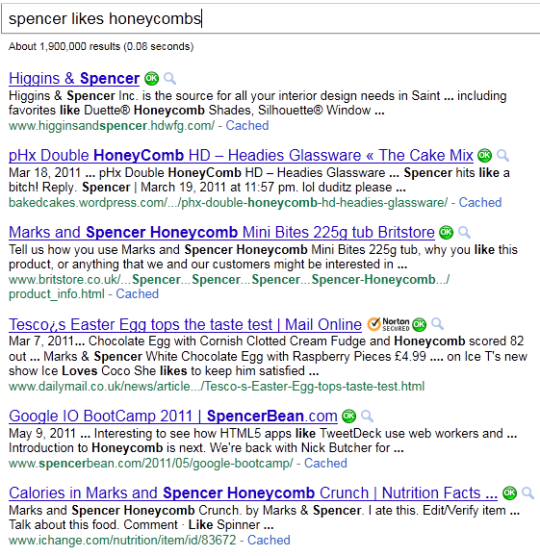
You will notice that NONE of the ranking sites were really targeting my keyword (of course not!). None of them used the exact keyword in the title of their page and only use bits and pieces of it in their content.
So, if this were a keyword idea I was hoping to rank for, I would immediately get excited because I would know that no one is actually trying to rank for this keyword!
Even if these sites had lots of links or a high authority I would still feel confident in my decision (of course it's better to target keywords that have weak competitors both in content relevancy and links, etc).
Does that make sense?
So, to make my point even more vivid, I guessed that this post (the one you are reading) would quickly rank very high (perhaps #1) for the keyword: Spencer Likes Honeycombs!
The reason? Simply because I am mentioning the keyword in my article here. I don't need any links or anything else. Just relevant content that mentioned the target keyword.
You can do a Google search for “Spencer Likes Honeycombs” and see if I'm still right several years after originally conducting this experiment.
So, don't EVER overlook the importance of relevant content in the article or the title and whether or not the entire site is targeting your keywords. This is why my first 3 points have to do with content.
And YES! You can still find lots of keywords that have weak title competition or content relevancy.
Spencer Likes Honeycombs!
Update: The above “Spencer Likes Honeycombs” experiment was conducted when this article was first written a few years ago. Here's what the Google results look like now:
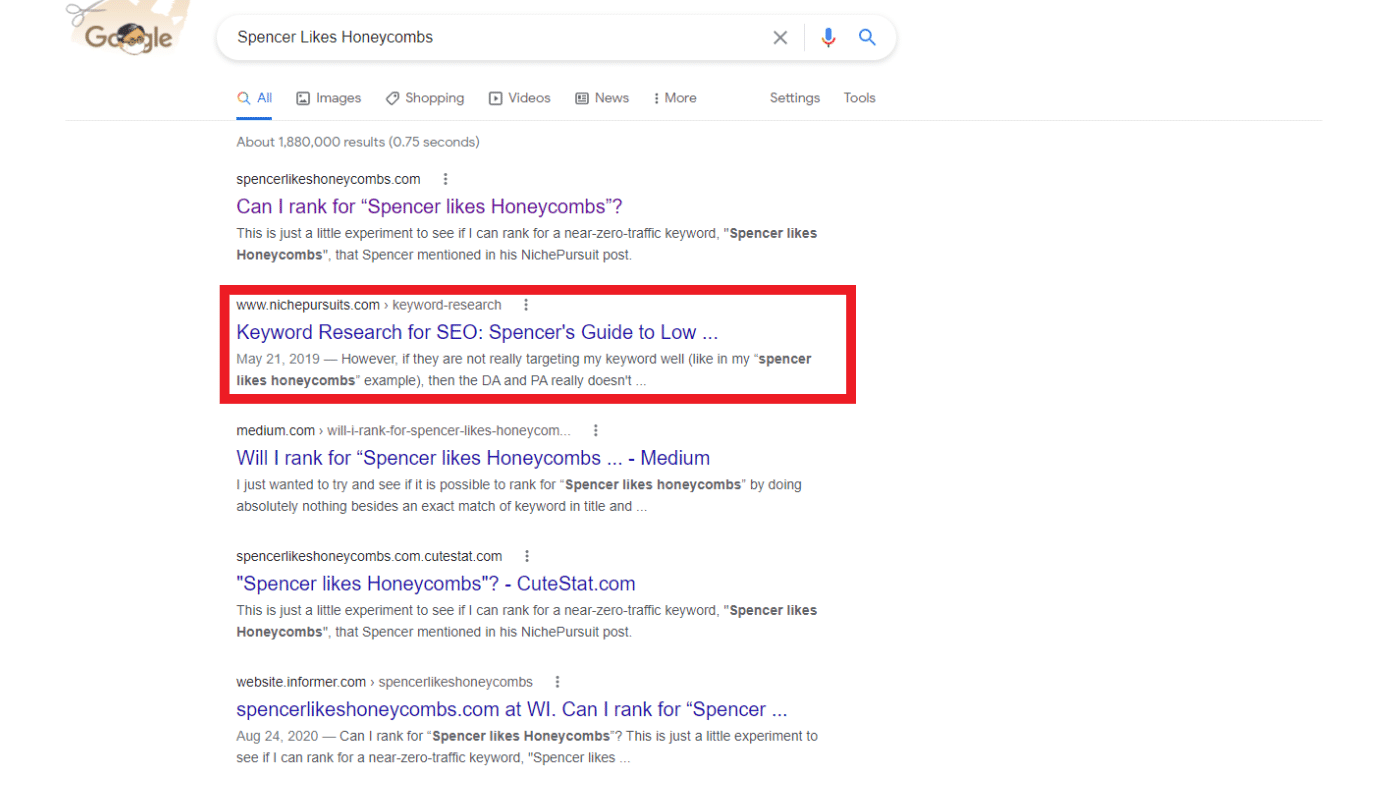
As you can see, Niche Pursuits actually ranks 2nd now for “Spencer Likes Honeycombs.” This is because someone created an entire website using those tips I gave to see if they could outrank me! Haha.
This actually further proves my point about the importance of relevancy. Google is now ranking the new website above mine (even though it has way lower authority) because it's more relevant!
The title of the page and the domain name includes the keywords, Spencer Likes Honeycombs.
Relevant keywords are extremely important to Google, who wants to meet a user's search intent with results that meet those needs.
Yes, this is a weird experiment because no one in their right mind would ever Google that keyword. But it's made my point extremely clear: relevant content is more important than authority in many cases.
Page Links
I look for less than 10 links to the page if possible. Links to the page are MUCH more important than links to the root domain. Each page of a site ranks individually, so the page links give you a better indication of how strong the ranking page is.
You can use tools like Ahrefs or Moz Open Site Explorer (with a free Chrome extension) to determine page links, page authority, and domain authority.
If the competitors in Google have relevant titles/content and have lots of links to their pages then you most likely shouldn't be targeting the keyword. You can determine on your own how many links is too many for you.
But ideally I like to find results with 10 or less links to the page. Though 30 or less is an acceptable number, in many cases.
Again, I don't stress out about how many links are to the root domain, unless the resulting page happens to be the root domain. In that case, a root domain that is optimized for your keyword and has lots of links built to it might be worth avoiding.
You will typically want to stay away from any search term that returns those types of results.
Page Authority and Domain Authority
I won't go into great detail about what Domain Authority (DA) and Page Authority (PA) is other than to say its a number assigned by Moz from 0 to 100 that shows how much authority a page or site has.
I like to see ranking sites with both a PA and DA of less than 30 if they are targeting my keyword.
If you can find 2 sites in the top 10 for your given keyword that both have a DA and PA of less than 30, that's a great sign that this might be a low competition keyword!
However, if they are not really targeting my keyword well (like in my “Spencer likes honeycombs” example), then the DA and PA really doesn't matter. So, don't get too hung up with the authority. Unless it's obvious that the ranking page REALLY is targeting your keyword.
If so, remember that lower authority is better for you.
Root Domain or Subpage?
If the top 10 competitors of a keyword are all root domains, I would probably avoid this. Generally speaking, this means that their entire site is targeted and optimized for your chosen keyword.
However, if all the ranking pages are something like: domain.com/subpage1/subpage78/directory/rankingpage.html – this is what you want to see.
The long URL is a good sign for you when looking at the top 10 competitors.
Site Age
Older sites tend to have more authority. I usually only worry about site age if I am targeting a more difficult keyword and need to do some more in depth analysis of the difficulty of ranking for a keyword.
Type of Site
As mentioned in my original list above, I like to see certain weak types of sites like article directories, forums, Q&A sites, social sites, or other user generated type sites.
The reason for this is that these types of sites are usually not very good at targeting a specific keyword.
Article directories might mention the keyword in their title, but they usually don't have any backlinks to the ranking page.
Some of these other types of sites usually just happen to mention the keyword somewhere in the content, but don't have an optimized page or any relevant links.
Hope that makes sense why these are types of listing you WANT to see in the top 10 (easy to outrank).
Keyword Analysis Guidelines to Follow…
These factors that I have discussed can be a lot to swallow at first. But I wanted to give you a quick list of some general rules that I use to decide whether or not to target a keyword.
- Target keywords where not all the results are using the exact keyword in the title.
- At least 2 of the top 10 results have less than 10-30 links to the resulting page (0 links preferred)
- At least 2 of the results with less than 10 backlinks also have a DA and PA of less than 30. Meaning 2 results need to have a DA and PA of less than 30 AND have less than 10-30 links.
- Target results with weak types of sites (article directories, forums, etc.).
- Target results where ranking pages are NOT root domains.
- Don't be afraid to target results where lots of other affiliate sites are ranking.
- Avoid results where lots of eCommerce sites are ranking.
So, if you can find a keyword where the competitors don't really use the keyword well in the title, 2 results have 10-30 or less backlinks to the Page AND have a PA and DA of under 30 – then you are MONEY!
Yes, this is ideal for a new keyword and can be very difficult to find. But it is possible. I always look for the ideal but often settle for something with just a little more competition if I need to.
I can tell you that my highest earning sites met the 7 bullet points that I mentioned above. So, its very possible to find keywords that meet this strict criteria.
And if you are patient in doing your keyword research and find these really low competition keywords – you significantly increase your chances of making good money with niche websites.
Niche Keyword Research Examples
Here are some good examples of keywords.
- “Best walkers for Seniors” – 880 searches per month
(Note: I've copied and pasted the factors to look at from my earlier discussion in this post).
Remember, I'm looking at just the first page results in Google to decide if I should target this keyword!
I've highlighted the factors in green that show this might be a good keyword to target. I've highlighted in red the factors that show this might be a more difficult keyword to target.
- Relevant Content. Yes, all Google results appear to be relevant.
- Optimized Title. I see 4 results that do not use the keyword in the title currently ranking.
- Page Links. I see 5 results that have less than 30 links.
- Domain Authority and Page Authority. I see 2 results that have a PA and DA of less than 30. I'd prefer to see more, but 2 is sufficient.
- Site Age. Only 1 site is less than 1 or 2 years old.
- Affiliate Sites. 4 of the ranking sites on page 1 are affiliate sites.
- eCommerce sites. 3 of the ranking sites are eCommerce sites.
- Overall KC score given by Long Tail Pro is 29
So, even though this keyword isn't perfect, it would still be one I would consider targeting if I were going into the Senior living niche.
“best non slip bathtub mat” – 390 searches per month
- Relevant Content. Yes, all Google results appear to be relevant.
- Optimized Title. I see 6 results that do not use the keyword in the title currently ranking.
- Page Links. I see 6 results that have less than 30 links.
- Domain Authority and Page Authority. I see 3 results that have a PA and DA of less than 30.
- Site Age. Only 2 site is less than 1 or 2 years old.
- Affiliate Sites. 4 of the ranking sites on page 1 are affiliate sites.
- eCommerce sites. 1 of the ranking sites is an eCommerce site.
- Overall KC score given by Long Tail Pro is 29
This keyword is probably even easier to rank for than “best walkers for seniors.”
Niche Keywords I Would Not Consider Targeting
Now, here's a couple of keywords I would not target using my analysis:
“Best Phone for Seniors” – 2400 searches per month
- Relevant Content. Yes, all Google results appear to be relevant.
- Optimized Title. I see only 1 result that does not use the keyword in the title currently ranking.
- Page Links. I see 2 results that have less than 30 links.
- Domain Authority and Page Authority. I see 0 results that have a PA and DA of less than 30.
- Site Age. No site is less than 1 or 2 years old. (11 years is the “newest” site ranking).
- Affiliate Sites. 1 of the ranking sites on page 1 is an affiliate site.
- eCommerce sites. 2 of the ranking sites are eCommerce sites.
- Overall KC score given by Long Tail Pro is 53
I would stay far away from his keyword. Your chances of ranking for it are almost 0.
“Anti fatigue mats” – 12100 searches per month
- Relevant Content. Yes, all Google results appear to be relevant.
- Optimized Title. I see only 0 results that do not use the keyword in the title currently ranking.
- Page Links. I see 1 result that has less than 30 links.
- Domain Authority and Page Authority. I see 0 results that have a PA and DA of less than 30.
- Site Age. No site is less than 1 or 2 years old. (10 years is the “newest” site ranking).
- Affiliate Sites. 0 of the ranking sites on page 1 is an affiliate site.
- eCommerce sites. 9 of the ranking sites are eCommerce sites.
- Overall KC score given by Long Tail Pro is 42
Nothing about this keyword is good. You have 0 chance of ranking for this keyword if you are starting a new site, and especially if you are an affiliate site.
I hope these examples were helpful!
Free Keyword Research Tools
Your initial keyword research could begin in various different ways. Below I've compiled a list of several free tools and methods you can use to find new keywords.
If interested, you can read a more detailed list of the best keyword research tools (free and paid).
Google Keyword Planner
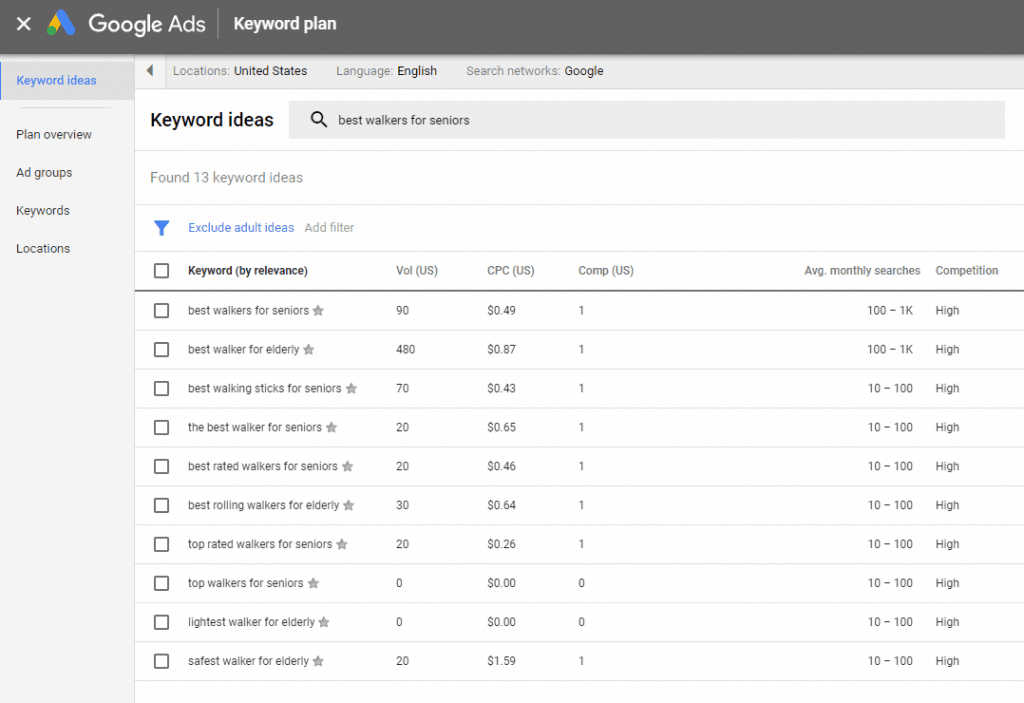
Data provided directly from Google for your chosen keywords, along with related keywords. This is a great way to expand your seed keywords into larger lists.
However, this tool was created for Adwords advertisers, not SEOs so it has some limitations.
Answer the Public

This is a great free tool where you input generic keywords or a seed keyword idea and it spits out tons of questions people are asking or phrases that include your idea.
This has both a free and a premium version if you want even more data.
UberSuggest
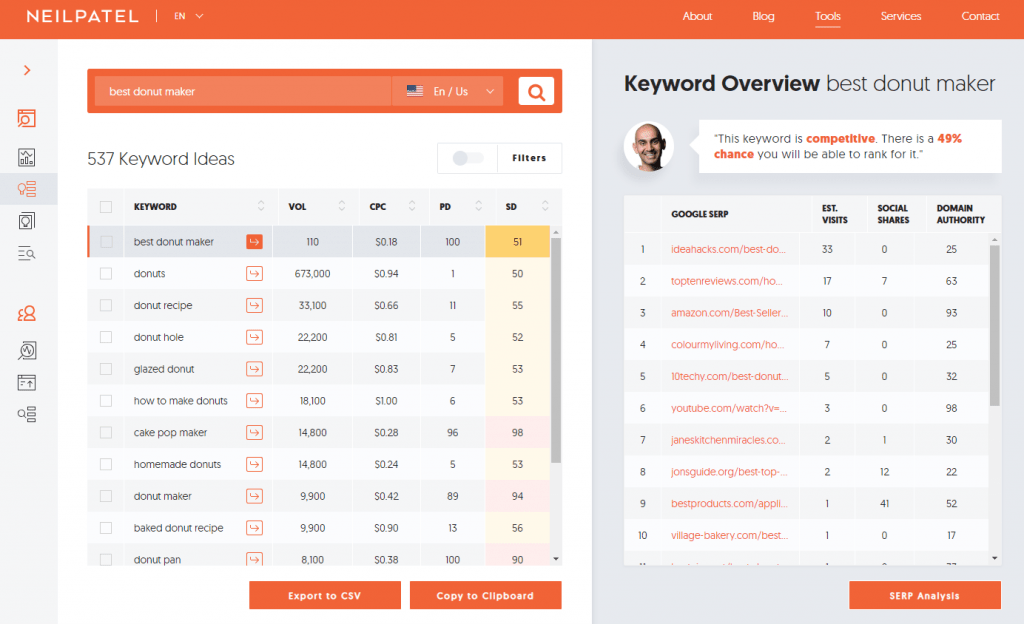
This free tool as come a long was since Neil Patel took it over. There's a lot of basic information that is available with the free account. Especially if you focus on keyword research versus domain research.
However to get the full range of tools you will need to look at the paid version. Some of the tools that were free for a while are now in the premium paid version.
The free version is still a great tool to start with.
You'll just need to move onto the premium for more.
Google Trends
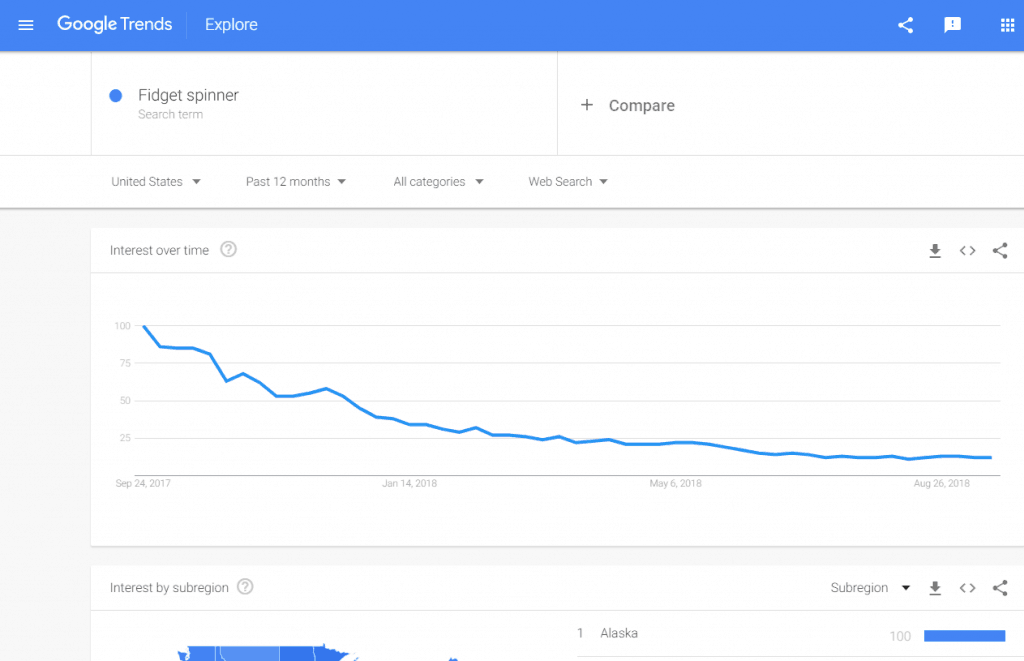
Google trends won't really give you lots of new keyword ideas, but it will allow to see what is trending up or down. This could help you avoid targeting niches or keywords that are dying off.
Google Related Searches
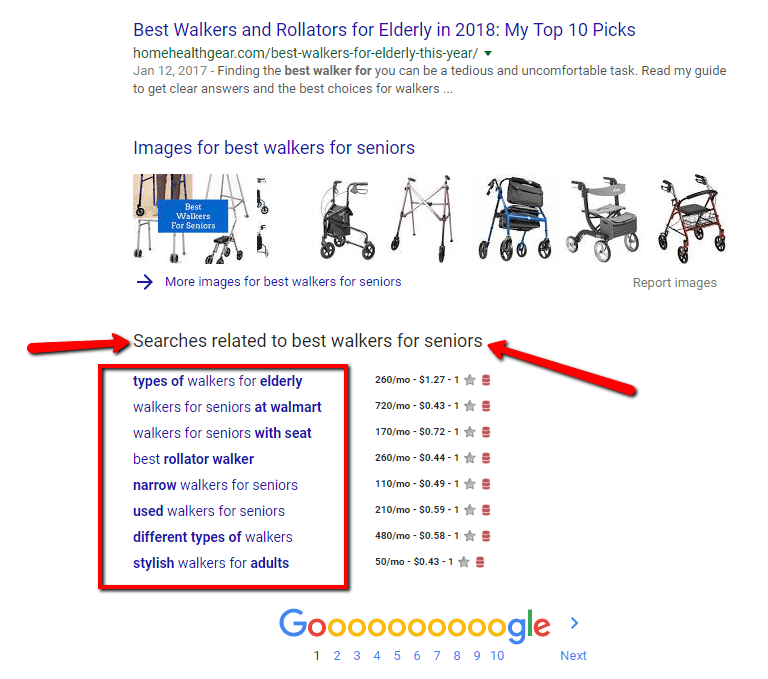
When you do a search on Google, there are “related searches” that Google shows after the first page of listings.
These related searches are not only a great way to get ideas, but also to optimize your content with additional keyword ideas.
Google Search Console
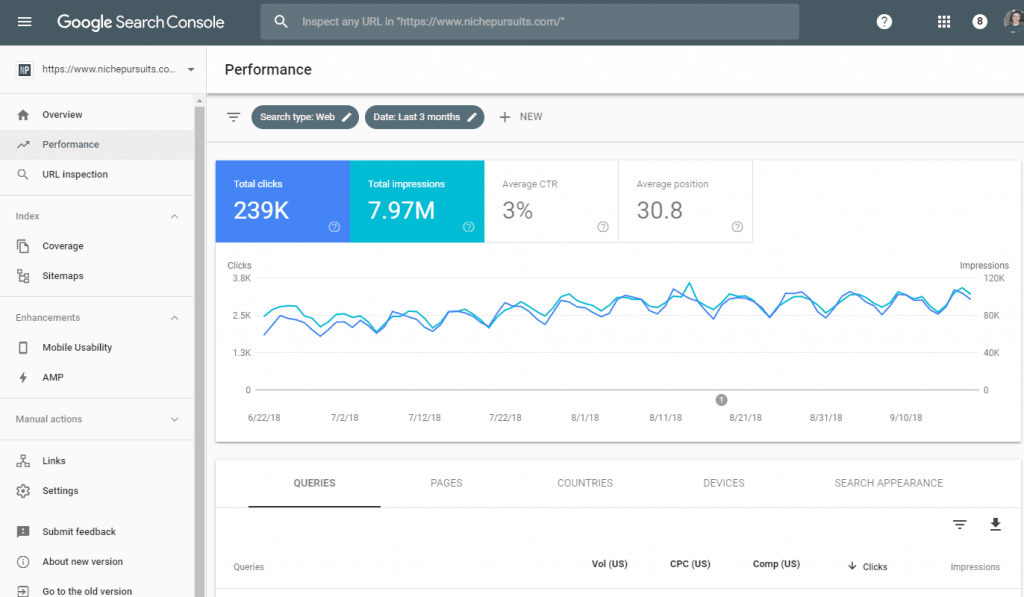
Once you have a site up and running, Google provides data showing what keywords your articles are ranking for.
This can be a treasure trove of new ideas as your content will often be ranking for things that you didn't even target.
Use these new ideas to create new content or update your old content and optimize for these new keywords better.
Moz Chrome extension
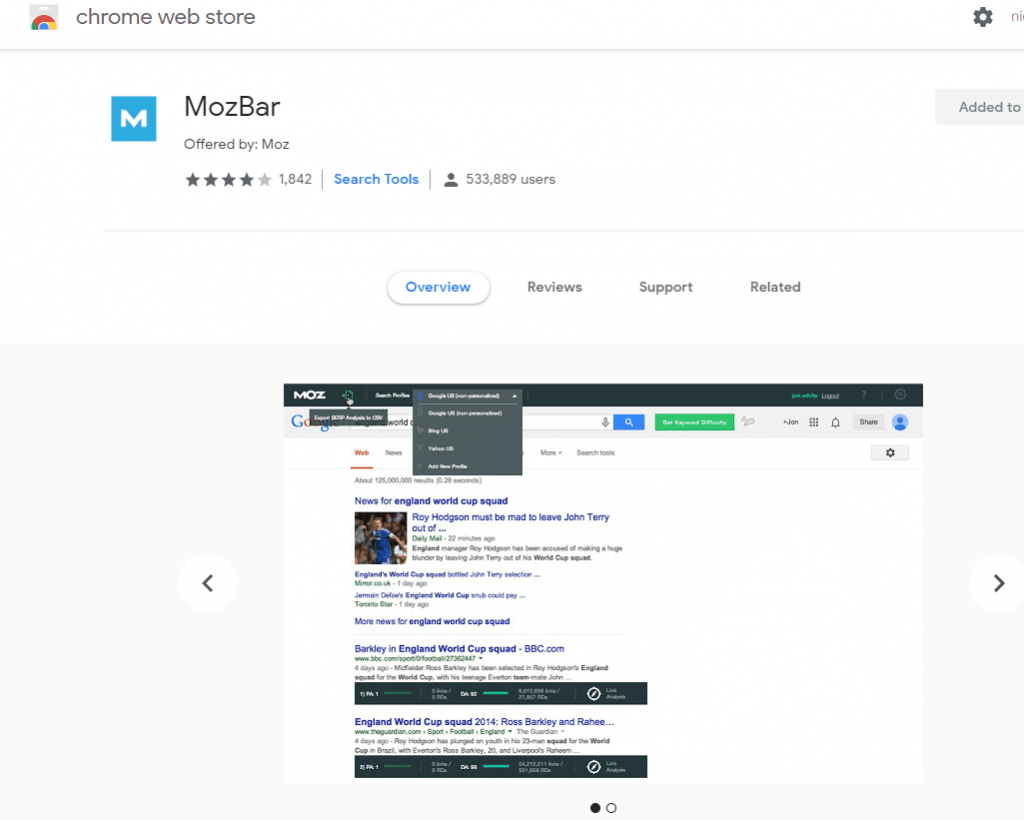
This is a great free extension that will show you all kinds of stats for the first page in Google including links, Page Authority, and Domain Authority.
SEOquake chrome extension
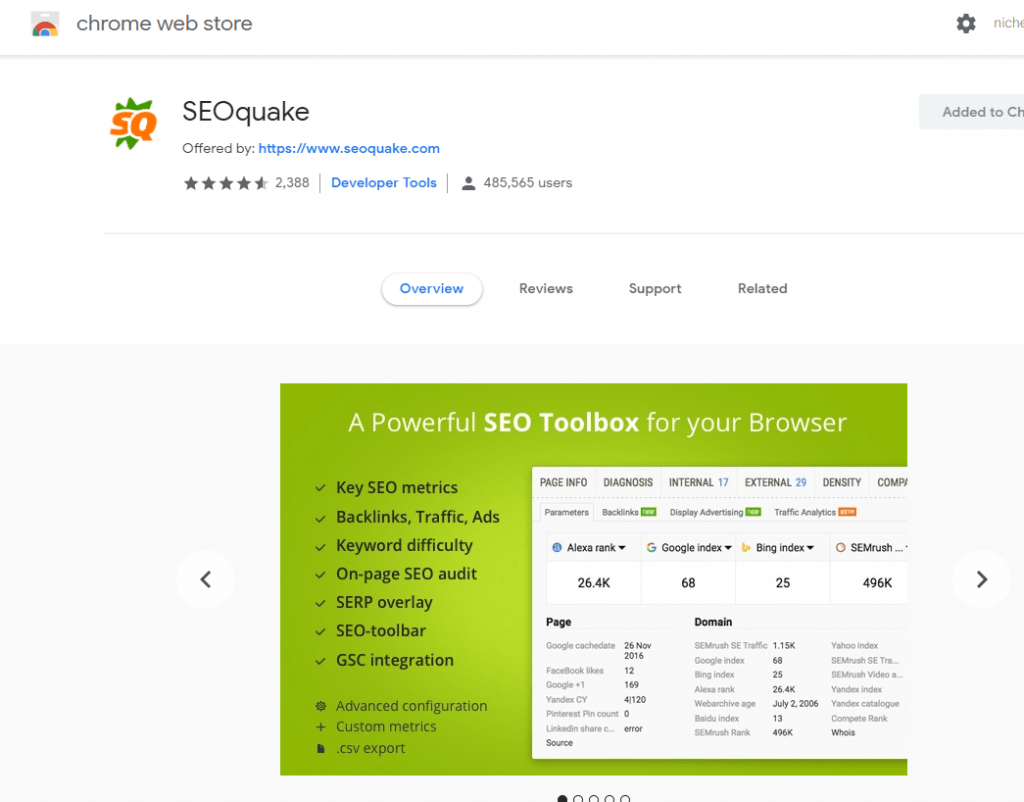
Although I haven't used it in a while, this shows similar results to the Moz extension, but using Majestic SEO metrics.
SEOrambler
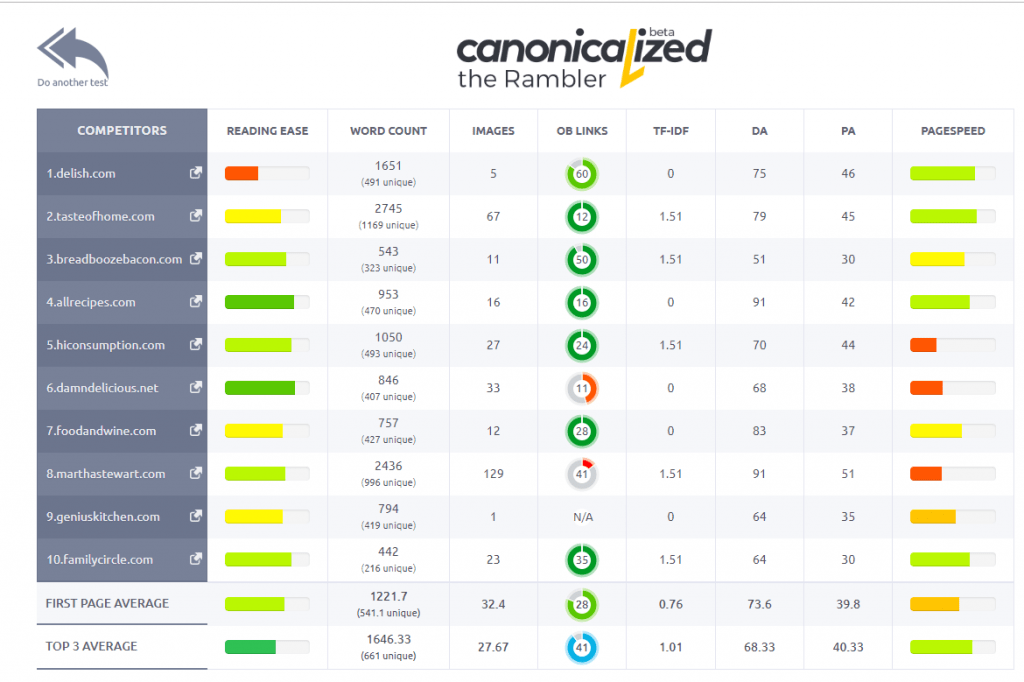
This is a handy tool that helps you analyze the first page in Google. It shows PA/DA, word count, page speed and more.
Premium Keyword Research Tools
Hundreds of keyword research tools exist on the market. The free tools but maybe you want to take it to the next level. Some will help you brainstorm for keyword ideas. Others will help you analyze the difficulty of ranking in Google for that keyword.
There are some good listings here of a keyword research tool that does both.
Here's a list of some premium keyword research tools:
SEMrush
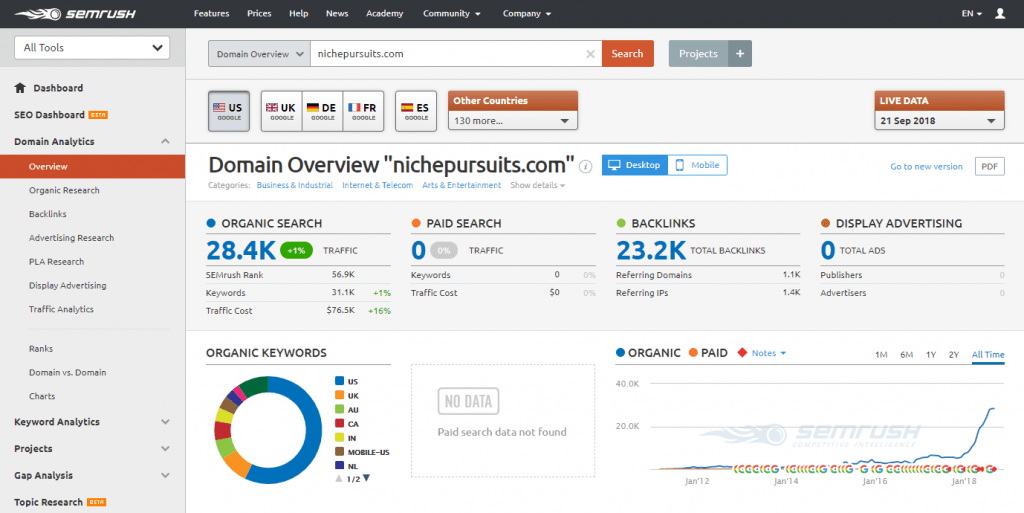
I love using Semrush to do competitor research and see what they're ranking for and then often target the exact same keywords. This works particularly well if you can find a newer or weaker website that is ranking for a few terms in your niche.
If a weak website is ranking for certain keywords, you can know with certainty that these are easy to rank for keywords.
You can see a full review and tutorial of SEMrush right here.
Long Tail Pro
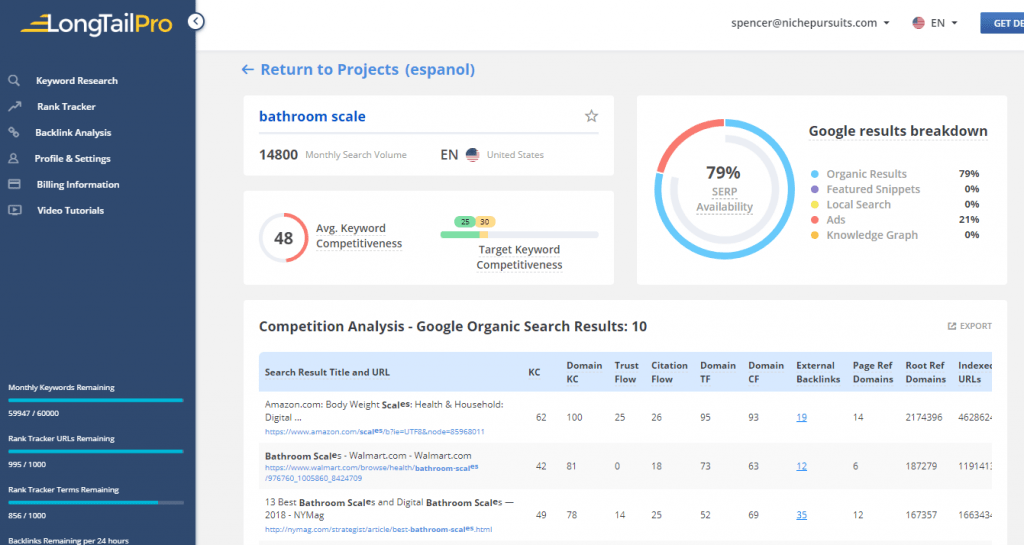
In full disclosure I am the original creator of Long Tail Pro. However, I've since sold the company as explained here.
Long Tail Pro is a great all-in-one tool that will help you brainstorm for keyword ideas, but will then go the next critical step and help you analyze the difficulty of ranking for that keywords.
Long Tail Pro has a “Keyword Competitiveness” metric that will quickly show you how easy or hard that particular keyword is to rank in Google. If the score is 30 or less, that's a keyword that is considered low competition.
Long Tail Pro is still the primary way that I do all my keyword research, check it out here.
KWFinder
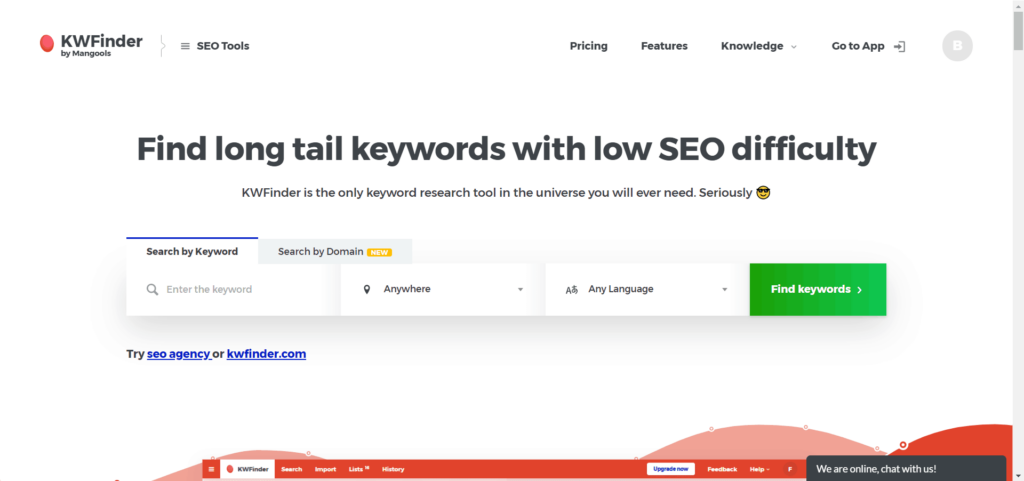
KWFinder is another great pick for a keyword research tool.
KWFinder allows you to find long tail keywords with ease. You can find keywords with buying intent (great for affiliate sites) or informational keywords (great for link building). This tool also lets you scout out SERPs, figure out what your competition is ranking for, and mine backlinks.
Along with Long Tail Pro, it has my favorite keyword difficulty rating. I've found it to be fairly accurate.
You can check out our full review here.
Ahrefs
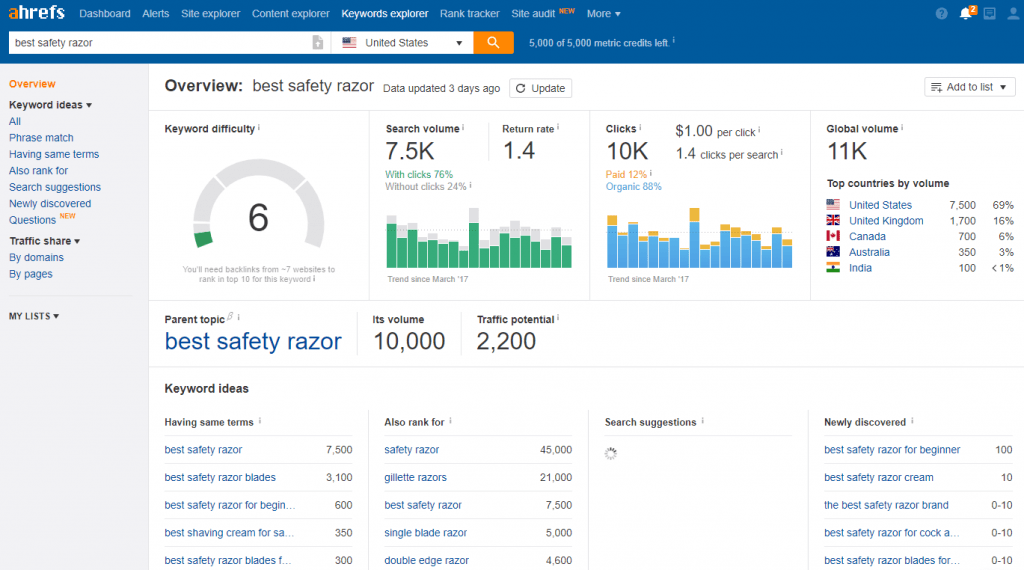
I don't personally use Ahrefs for keyword research, but I know plenty of people that do. I'm including it on this list because I hear good things about their Keyword Difficulty score and their estimated monthly searches have gotten more accurate recently.
I primarily use Ahrefs for the backlink analysis, but the tool provides keyword research functionality, rank tracking, and more (as do some Ahrefs alternatives).
Keywords Everywhere
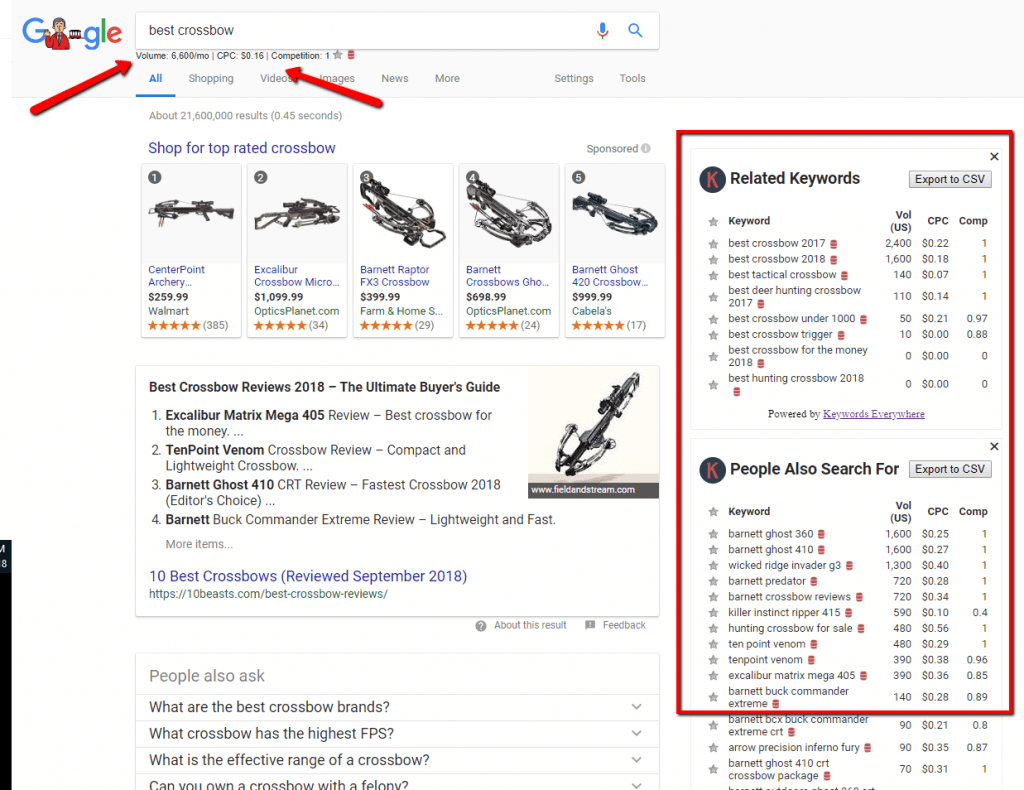
This is a great cheap chrome extension that will show you the search volume of keywords as you type them into Google, Amazon, eBay, and several other places. I find that this comes in handy on a regular basis.
Honestly, there are probably hundreds of other keyword research tools out there. However, these are the only ones I use and am familiar with, so I'll only mention what I've personally used.
Your Thoughts on Niche Keyword Research
All in all, I have provided you with everything you need to know for keyword research and how to determine if the keyword you are looking at has low competition in the top 10 of Google. Yes, it takes lots of keyword analysis and know how.
That's why only the diligent succeed with keyword research, building websites and search engine optimization, there is no shortcut.
I have been as detailed as possible in this post. I am very interested in hearing your thoughts on this subject. Are there other factors that you look at to judge the Google competition before you target keywords? What comments or other questions do you have in regards to this subject?
Want to learn step-by-step how I built my Niche Site Empire up to a full-time income?
Yes! I Love to Learn
Learn How I Built My Niche Site Empire to a Full-time Income
- How to Pick the Right Keywords at the START, and avoid the losers
- How to Scale and Outsource 90% of the Work, Allowing Your Empire to GROW Without You
- How to Build a Site That Gets REAL TRAFFIC FROM GOOGLE (every. single. day.)
- Subscribe to the Niche Pursuits Newsletter delivered with value 3X per week
My top recommendations
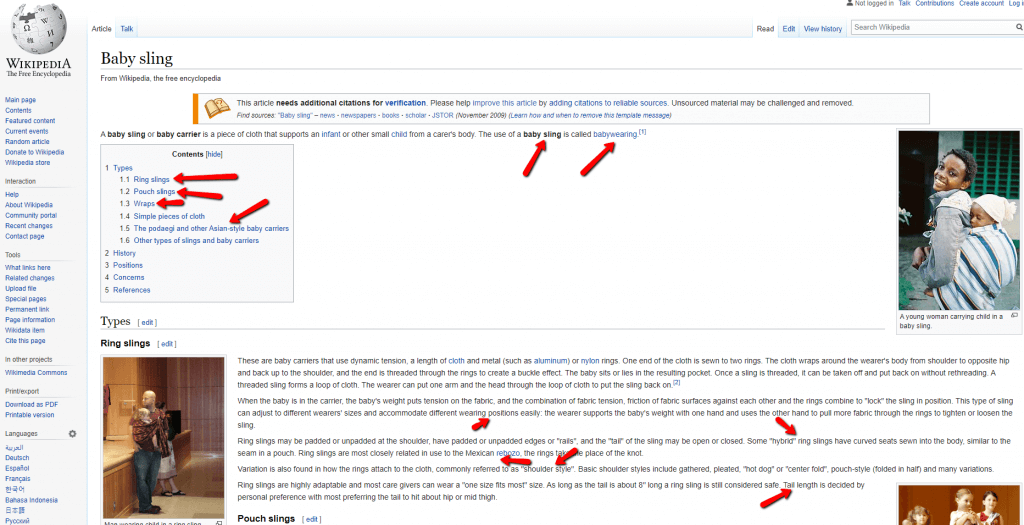
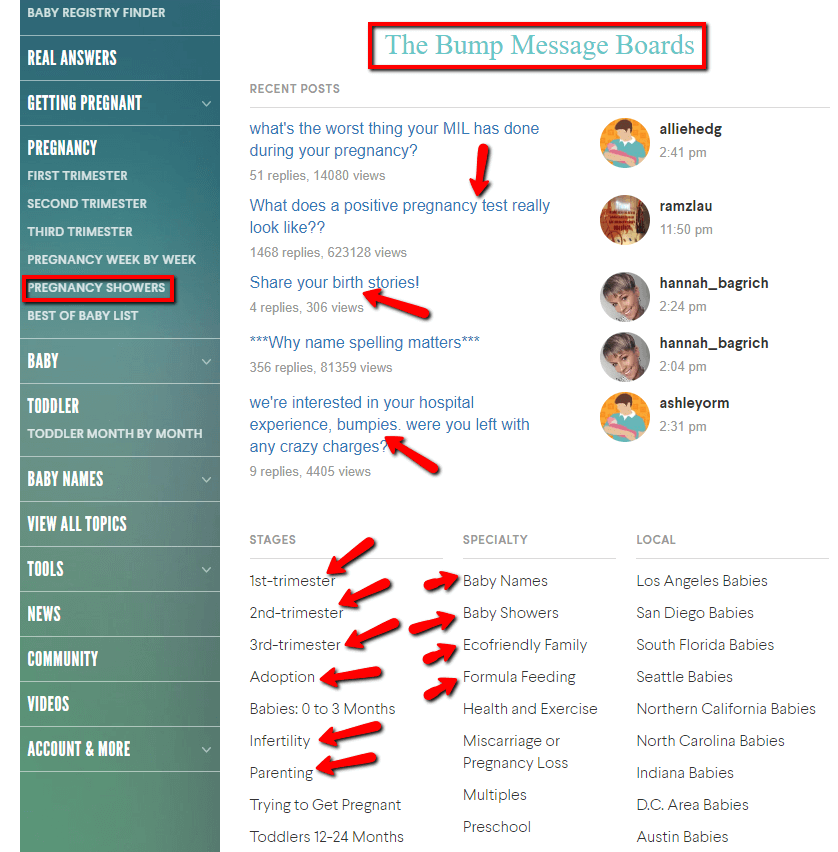
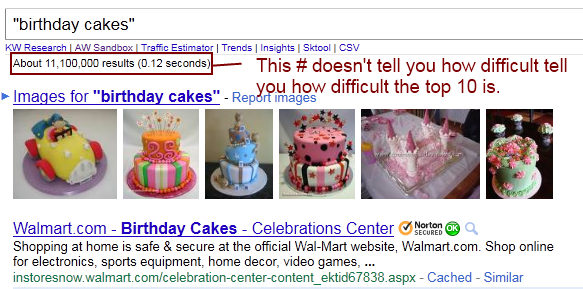

















305 Comments
Conversation
Trent likes Cheerios! Haha..
Great explanation Spencer…and yes, you are already ranked #1 on Google for Spencer likes honeycombs.
You did a fantastic job of spelling out all the important details and I have learned a ton from you already. I have no doubt that my next 30 niche sites will be easier to rank than my first 30.
Thanks!
Awesome – #1 in Google! 🙂 . It took less than 10 minutes for my experiment to be a success – no links, no effort – just used the keyword. Hope that drives home my point for people.
Glad you found the post useful, and I hope your next 30 niche sites are a success!
Hey Spencer have a question. Should we be concerned with the top 3 results? I’m finding a lot of niche’s where either….
1- the #1 site is strong the other 9 aren’t
2- the top 3 are weak BUT sites are strong down
If the top 3 are weak sites, that a very good sign for you. Depending on the search volume, ranking below the top 3 (anywhere on the first page) is just fine.
@Trent: “Trent likes Cheerios” is now ranking #2 in google XD
Checked it out Spencer & indeed you rank #1 in Google for keyphrase “Spencer likes honeycombs”.
With everyone wanting to find low competition sites (& the competition seemingly increasing), it’d be great to see a case study of an income generating site from you. You don’t have to reveal the exact domain, the keyphrase could be enough.
Anyway, enjoying the content here & now I can’t read my comment as I type this. Weird!
It
A case study huh? I will have to see what I can put together. I certainly won’t reveal any of my domains, but perhaps I can figure something out. You can always make the comment box bigger by dragging the bottom right hand corner.
Tnx for your valuable content.
I have a question that
What if 10 results come with 9
affiliate sites (or niches site) and 1 e-commerce site?
Great post Spencer.
A good tool that I use for keyword research is Traffic Travis. If will tell you the top 10, or 20, sites for a particular phrase and also list the domain age, PR, page backlinks, if the keyword phrase is in the title etc.
Best of all it’s free! There is a professional version which you can buy but I find the free version great for quickly checking competition.
Yes, Traffic Travis is another good free version.
Hi Spencer,
Keyword research is without a doubt the cornerstone of any profitable site that gets a lot of traffic from search engines like Google.
But that’s what the most ignored part of SEO by most bloggers. Either most people do it all wrong or don’t focus on keyword research at all. With the introduction of amazing SEO tools like LTP, SEMrush, Ahrefs and so on, keyword research has become so easy.
You just need to focus more on searcher’s intent rather than finding low competitive keywords. That’s when you’ll start ranking for money making keywords and attract high quality visitors from search who’ll find what they are actually looking for.
Thanks for the great tips!
Hey Spencer- a few months back I choose a difficult keyword but I’m starting to break through in the rankings. The hard work is paying off and I had a $5 day Sunday. Nothing to quit my job over, but a step in the right direction. I definitely need to do better keyword research so it’s not as difficult next time. Thanks for the great tips & I hope I can get there in the near future.
Thanks!!!
Best of luck!
Thanks for the post. Nice to see quality content without a sales pitch.
I haven’t focused enough on competition. Until recently I thought the competition bar on the google keyword tool was talking about organic result competition, not advertiser competition.
Thanks again for all the free info!
Blake
You’re welcome Blake!
AWESOME Spencer!! Love how you detail it all out—
I’m curious to here your thoughts on competing against Amazon. Usually it’s not the root domain ‘amazon.com’ but a page on their site for a product.
And this questions applies to any of the big authority sites that have good PR, lots of BL’s to their site overall.
Let’s say hypothetically you had a all Top 10 spots filled with Amazon that had little backlinks to their specific page, and where not well optimized. Would you consider that pretty easy to rank for and beat?
(if i’m making any sense here, lol)
Thanks!! =)
The answer is yes. Its easy to outrank Amazon.com or other “authority” websites if they are not really targeting your keyword.
Thanks for laying it all out there. I really enjoyed the article and the podcast you did with Trent last week (it’s on constant replay in my car). When I first started researching which domains to buy, it was like a bomb going off and shrapnel flying everywhere – I had no strategy or clue what I was doing. The bad news is I spent about $80 on domain names for crappy niches, but the good news is I didn’t waste time building out those sites 🙂 Lesson learned. I’m much smarter about it now, thanks in part to the information I’ve read on your site. Thanks again for the useful content and instruction.
Deborah, sorry you had to deal with shrapnel – sounds painful! 🙂 . Hey $80 is small price to pay if you learn from it, which it sounds like you have. Best of luck with your future sites!
Great post. Supprised you didn’t mention Exact Match Domains. Seems like when everyone is talking niche EMD comes up. My personal thoughts are that here in the next year or so EMD’s will have no bearing on search results so it doesn’t matter. If you can get them, get them, but don’t have that be the reason for you to not enter a market. A lot of niche pros say if they can’t get them they move on. What are your thoughts?araAlso,What are your thoughts on that.
Dustin: I have covered the EMD in detail in a couple of my previous posts – read the Niche Websites Hub here to catch up on old posts: https://www.nichepursuits.com/niche-websites-hub/.
If the EMD is available I get it. If not, I just get a domain that has the keyword with a prefix or suffix added. EMD is not required, but still preferred.
Also, what about ecommerce sites? a Niche I had looked into has many. best buy, amazon, homedepot, walmart, overstock. I own EMD. No ranking root domain, 5 have phrase in title. 1.pr3 5 page links, 2.pr3 20 page links, 3.pr0 0 links to page, 4.pr1 1 link to page, 5.pr4 143 links to page, 6.pr5 28 links to page, pr4 16 links to page, 8.pr3 4 links to page, 9.pr1 o links to page, 10.pr3 96 links to page. That’s clost to your rules if the pr1 with 0 links was a pr0. Is that a go?
Dustin, its hard to say with certainty without actually knowing the keyword, etc. But from the data you provided it sounds like a low competition keyword.
Hi Spencer,
Thanks again for this gold information! I really appreciate it!
Considering my tactics: they are roughly the same, however
oeps…typing on my iphone had me accidently send on submit…continuing my previous comment:
Considering my tactics: they are roughly the same, however I mainly look at the first 3 results instead of all 10. I don’t see why I should be taking number 6-10 into account, since I only want to rank #1. If there is a weak spot at 1-5 I know that with a little effort I can beat them.
I do have a question about your speed (more than tactics) on selecting a keyword though. Can you share how much approximately it will take you to find a good domain or a group of domains? It still roughly takes me an hour to find one, or a couple of hours to find a couple of good domains…I think I could and perhaps should speed this up. What is your idea on that?
Thnx!
Peter
Peter, top 3 is even better.
I think an hour to find a keyword is probably pretty typical. Sometimes it can be longer for me, or sometimes I can find a whole group of keywords is less than an hour, it just depends.
Hi Spencer great tips and these are the same rules I use when comparing keywords in market samurai. You may also want to use scroogle to see an un-bias result.
Google tend to favour certain site but with scroogle you can see the top 10 or more competition. Market Samurai allow allows you to see how many backlinks also. Thanks again for this post as I am going after a few keywords that are not sort after at the moment.
Nice one Spencer you are No1 in Google UK as well, I even left The ! in the when searching.
Great post
Awesome – Spencer likes Honeycombs has gone international!
Nice post Spencer!
Do you have an exact date for the Long Tail Pro Launch?
This IS the most detailed competitor analysis on the web!
PLUS honeycombs! 😀 It doesn’t get any better than that!
Thanks for rocking the niche site world once again!
Thanks Victor!
Spencer – I’m lovin this post! Thanks for the insights. For finding keywords in titles, I’ve used the “allintitle:” operator in the past, but after seeing your tactic (just analyzing top 10), I realize it’s probably not needed anymore. Time saver! Thx.
Quick question about link building. After following your 5 guidelines above, how does your link building typically go? Do you start off with a handful of links, or is it usually not necessary?
Peter – Brad Callen’s Niche Finder tool shows you whether or not the .net, .org, or .com domains for a given keyword are registered. That may be a good place to start (it’s saved me a bunch of time)
Yep, “allintitle” doesn’t really matter. Its just takes up extra time.
I just start with a handfull of links – no need for overkill.
Question have to ever experiment with the golden keyword ratio method?
Thnx! I’ll dive into that 🙂
WOW. You took an entire subject that many people take entire books to explain and whittled it down to an easy to understand, easy to follow article.
Thanks for making this topic so much clearer. I have bookmarked this article and I will refer to it every time I start researching a niche for a website.
I tried to lay it out as simply as possible – but there really is much more nuance and detail that I could have gone into. I will be covering much more as you can see on the Niche Websites Hub. Thanks for bookmarking!
Thanks for the great article. I am still struggling with the discipline part of choosing keywords with little competition.
I researched for about 5 hours last night (just 1 hour? Ha!), and ended up choosing a keyword and building my site.
Now that I read your article, I realize that my article choice might not have been the best.
Oh well, another day, another site 🙂
I meant to say “keyword” choice instead of “article” choice
JJ – yes keyword research can take a long time – even 5 hours sometimes unfortunately. But if you find a winner – it can be well worth it!
So when we have all retired on the proceeds of our niche websites that we learned to build here where do we send the “thank you” honeycomb?
lol! Instead of sending me honeycombs, just send a kind thought my way every time you eat honeycombs (which everyone should be doing more of in my opinion). That’s good enough for me! Okay, this is making me hungry…
F’n Bravo Spencer. This is great stuff. Keep it coming!!
Thanks Tim – more content will be on its way!
Great post, I don’t even remember how I stumbled up on your site’s but the previous and now this one are quickly becoming a favorite past time and are loaded with great content, keep it up your my favorite inbox notification….Chris
Glad you are liking the content Chris and glad you found my site!
You’re doing a great job in building up the demand for Long Tail Pro, bro 😉 I wonder how many others are noticing that? I have the wants, it’s like having a Jones for Honeycombs.
This article is a very good analysis of evaluating competition without getting mired into the depths of “paralysis by analysis”, were so many of us seem to waste our time.
A point worth mentioning is, it’s better to attack against very stiff competition, or even attack in a disorganized way, than it is to sit and wait for exactly the right opportunity.
Actions speak louder than words, so best that I stop commenting and start ranking 😉
Its all about action Dave as you suggest – try some things out and learn from the experience; it really is the best teacher.
Thanks Spencer, do you just rank for one keyword per site or several keywords per site
I target 1 primary keyword per site; but most sites will have articles on similar keywords although these are not my primary focus.
hi Spencer,
May i know which type of niche you are more interested, or that earns more based on your experience
a) keywords about a physical product
b) keywords about a service like cleaning service + local city or country
c) keywords about digital products like softwares – anti virus softwares , hosting, web designs
d) keywords that have -> how to “problem”
do you target 4 to 5 words long tails keywords ? or is 3 words just fine ?
It really depends – anyone one of those categories could be high paying, just based on the exact keyword targeted.
MUST…HAVE…LONGTAIL PRO..!!
lol good analysis Spencer
Tipjar – thanks!
Hey Spencer, you nailed it! Good job! This is the first time I saw someone doing real results with ranking and competition analysis. This is truly one of the best to analyze top 10 competition.
Spender, if you found EMD for certain keywords, do you still analyze the top 10 competition of just grab them?
Fliperguy
Jeremy – I definitely still analyze the top 10 competition even if an EMD is available. An EMD doesn’t make that big of a difference, so I will pass (and have) on lots of exact match domains if the competition is too difficult. I prefer an EMD for sure, but its certainly not required.
Paolo likes doublecheese burgers!
Now let’s see how long before that keyword ranks hehehehe…
BTW great post! This is probably the best post on this site. And your competition analysis is one of the best I’ve read so far. I look forward to more posts and of course to LTP!
1 question though, you used an existing website to rank for your keyword “Spencer likes honeycombs”… But what if you created a brand new website say , http://www.spencerlikeshoneycombs.com, how long does it take based from your personal experience for it to rank to #1 in google?
Paolo, how long all depends. Of course most keywords are not as easy as “Spencer Likes Honeycombs”. That was just an example to drive home the importance of relevant content. So depending on the competition for your keyword, it could take only a couple of weeks to rank or it could take 10 years (or never).
Sometimes I still don’t rank well for some of the sites I build, so there is no “typical”. However, the fastest is probably 2 weeks.
And 1 suggestion, could you add a “subscribe to comments” functionality please? Thanks.
Paolo – absolutely! If I don’t have it by the next time I make a post, I will stop eating Honeycombs cereal for a week!
Spencer,
You are absolutely ON POINT with this post. We went over something similar on our site about looking at the competition, but much less eloquently and value-packed than what you’ve laid out here.
Our process for judging competition is part of our KW research process as well. We’re currently looking to replace ourselves as much as possible from the KW research, but we’re debating whether or not this step and the actual selection of the niches should still be left up to us, rather than given to one of our trained agents
Question for you:
My business partner, Joe, was thinking it would be a great idea to ACTUALLY QUANTIFY this subjective process by assigning a numerical value to it, based on a set of parameters. That way, we could have agents total up the numbers based on the variables we give them, rank the keywords high-low, and then pick out the keywords that are best targeted. Does that sound possible to you? Think it’s worth exploring or should we resign ourselves to always having to do this step ourselves?
Justin – I believe its possible and I’ve been dreaming of building a tool like this for years. We essentially know the factors that rank a site and Google gives us all the answers (they show us what sites rank); so it really is a matter of statistical analysis. However, reverse engineering Google is too big of a project for me right now, lol! So, I will just have to be happy manually doing keyword research for now. By the way, if I do ever create such a tool that is quantitative in nature as you suggests, I would probably keep it to myself – sorry!
Hi Spencer:
You really made this so simple and streamlined to zero in a KW…This is great!
I just wanted to confirm some other factors that goes with selecting the final KWs:
1. Search volume – per your other posts, search volume should be > 1000. Is this exact match and Global SV?
2. How about buying KW or commercial intent or earning per click or CPC numbers?
The KW may be low competition, and good SV, but if I can not monetize it (site) then the KW is a target KW, right?
I think I know the answer, but just wanted to know your take/confirmation!
Looking forward for the LTPro relaunch!
Keep up the great info sharing, Spencer!
Guatam: great questions, but I answered them all a couple of days ago in this post: https://www.nichepursuits.com/search-volume-and-cpc-criteria-of-a-winning-keyword/. Check it out for very detailed responses to your exact questions.
great one! btw I always see mr Trent Dyrsmid as the first comment.. lol..
Hey, thank you very much for the awesome post, Spencer. One of my friends referred to your blog when I asked him a couple of questions regarding kw research and backlinking.
After visiting your blog, the following things happened.
1. I read the first post in your home page.
2. Instantly subscribed to your blog.
3. Within in the next 2 hours, I have finished reading all the posts of your blog + your pages of older blog.
Nothing more to say, bro. It’s just that brilliant. Simple and solid.
Now waiting for Long tail Pro …. 🙂
Thanks again..
Thoufeeq – that’s awesome that you have read through all that stuff! Quite an accomplishment 🙂 . Seriously, it means alot to know how much you appreciate the content I have written. Best of luck with everything…and tell your friend thanks for recommending the blog!
This is the post I have been long waiting for! Direct One way information based on PURE top 10 competition! This goes to show my anal-ness in finding the right keyword is proved to be right on par with a business model that is successful by you spencer! I’ll be attributing this post to my readers on my site, as it’s pure quality!
Thanks again and looking forward on a new post possibly on ” conversion testing” 🙂
ShakD
ShakD – yep analyzing the top 10 is critical; glad I could provide some validation to your process.
Spencer I want to firstly commend you on an informative site. I have a question. This may be the obvious but I just want to make sure. You have your main keyword (Spence likes Honeycombs) that you are targeting for your site and you do the above analysis. Do you do this sort of analysis for all of the other keywords that you will be targeting on the site?
I only do the major analysis for the primary keyword of my site. The other articles will target other keywords, but I don’t really look at the competition for these typically. They will simply be related or supporting articles. So on a site that targets “Spencer likes Honeycombs” I might have articles targeting other related keywords like “Spencer also likes Bean Burritos” or “Honeycombs vs Honey Nut Cheerios” . But I only really analyze the competition for the primary keyword. Hope that makes sense!
Yes it definitely does makes sense. Thanks for that clarification.
Thanks for confirming. I was thinking of doing this process for every keyword, but if you target at least 4 tail long supporting keywords i think there is no need to analyze top 10 for each.
hi Spencer,
if your website’s main keyword Spencer likes Honeycombs
1. about how many articles or pages you will create that is related to it? 5 to 10 pages ?
2. and how many internal links you will link to your main page ?
Spencer – you’re blowing my mind with this stuff man! The power of this post is in its simplicity. I’m sure you’re very knowledgeable about this subject and could write a book about it, but you pared it down so a beginner like me can wrap my brain around it. Great writing.
Ben – thanks for the compliment about my writing! I’m a pretty simple guy – so that’s just how I write I suppose!
Or you could use a tool like {URL Removed} in order to check competition very quickly. When checking 100’s of keywords, this can really quicken things up.
It is still important however to know this stuff because a tool is not a total solution. But it sure does help!
Mitchell – I removed the URL as it could be seen as promotional. The 4 tools I listed in my post do essentially what you mention very quickly as well. Hope you understand. Thanks.
I’m not affiliated with them in any way except as a user. I used to use Market Samurai, but I’ve found the tool I mentioned to be superior in almost every way except for being able to export to CSV. I do disagree with your decision to remove the link as I feel that you are taking away a valuable resource from your readers. If you want to remove the hyperlink, that’s understandable. But I disagree with removing the address completely. But, your blog, your prerogative.
Mitchell what was the tool that you mentioned?
I understand not including the URL but a quick mention of the tool would suffice. Always looking for new suggestions from other users. Hopefully Spencer you don’t mind since Market Samurai is mentioned hear as well and I don’t see it taken down.
thxx for the great posts here
I downloaded SEO for Firefox. When I did a google search, it showed all of categories for each result, but it had a “?” next to each one. I had to actually go to the website to see the stats (page rank, backlinks) on the toolbar. Does anyone know what I did wrong?
Ben…Click on “?” and see what happens. Its like magic 🙂
Usually if you hit refresh on your browser and/or hit search again on Google; the stats show up. I’ve had the same issues, but refresh and search again takes care of the problem typically.
Hmm. I refreshed and searched again, but it’s still not working. It does show up when I click on the “?” but I’d prefer not to have to do that every time I want a stat. Any other suggestions are welcome. Maybe I’ll just try SEOQuake.
Hi Ben.
I had a similar experience with SEO for Firefox when I started. Under Options, I hid all Info blocks, and then added back the ones that I needed by setting them to Automatic or On-Demand (On-Demand needs a click on the question mark). After that, it worked great.
Now, if only I can find a great niche keyword. After 5 hours seraching, I have 3 maybe’s, but no definates yet.
Hi Spencer. This site is awesome. I’m already subscribed through email and also read your post on my rss reader. I’m waiting your new post.
Spencer, do you set geographic target on Google Webmaster? Says in US.
Nope, don’t even use Google webmaster tools for the most part.
Spencer. Awesome Blog!
I am still confused on the All in One SEO Pack. Do i need to be plug in keywords in the Title, Description and Keyword info for each page i create and each post? Or does the settings for plugin automatically do that. ?
Did you do that here for “Spencer likes honeycombs”?
This would be valuable info for those who use the plugin. I have a niche site with the plugin and i was curious how you use it since you seem to recommend it for your niche sites.
Thanks!
The all in one seo pack has some general site settings that you can set initially; this is all I do. I set the site keywords, home Title, etc. I do not set anything up for the individual posts or pages. So, I didn’t do anything for the post on this site for “Spencer likes honeycombs”. Hope that helps.
Hi Spencer i am aware that you target your primary keyword and the other related keywords chosen are more for articles/content. Just how much do you optimize the related keywords for on page seo? Do you do the same amount as for the primary keyword eg Title, H1 Tags ect as this would also help them to rank highly as well as the primary keyword,
Thanks
Lou
I optimize the title on the other keywords, that’s about it.
thank’s . nice information
hey spencer, thanks for sharing all of your experiences and knowledge. A question that must be answered somewhere but i don’t see is:
do you ONLY use exact keyword.com/.net/.org. or will you add prefixes/suffixes?
i even see people using a single letter, “X” after the keyword?
what are your thoughts?
thanks!
I am fine using a prefix or suffix. Adding an X is just fine.
I understand about the low competition keywords, but do you still care about the search volume? I don’t see any mention about that. I’m pretty new to all this, so if this sounds stupid….forgive me:) but just the spencer likes honeycombs example…..yes, you are ranking #1, but who would be searching for that phrase? So if you rank #1 what difference will that make if it has no search volume? Does that make sense? Yikes….
The example was to show the importance of relevancy in the content. Certainly you would never go after a keyword unless it gets good search volume; read this post: https://www.nichepursuits.com/search-volume-and-cpc-criteria-of-a-winning-keyword/
Hi Spencer!
Amazing post. I’m learning how to do niche websites myself. IT’S REALLY HARD. I keep wanting to say “oh hell, I’ll just pick this keyword and be done with it” but after reading your article, I’m refraining. Your post answered a ton of questions about pagerank, I didn’t realize that it’s only valuable in certain scenarios when everything is directly related to the keywords.
I’m using market samurai, and I was just wondering… what’s the difference between BLP and BLD? Any idea what those terms are? I know BL stands for backlinks. That’s it. From what I understand, BLP is the one we have to really be concerned about, I’m guessing those are the actual backlinks to the site?
I don’t use Market Samurai, but I would imagine that BLP means backlinks to the page and BLD means backlinks to the domain. You should be most interested with the backlinks to the page, as I explained in the above article.
thanks for the article is very useful for beginners like me…
I wait for another article. !
You’re welcome!
I have a beginners question 🙂
If you open an hosting account and want to have several domains, then it seems that I need to associate them with my main domain.
For example:
my main domain would be xxxx.com and the other domain (yyyy.com) would be accessible via yyyy.xxxx.com and yyyy.com.
I hope I understood it correctly. my question is, if and how would it affect seo rankings? What would be your advice?
If you want to host multiple domains on one hosting account (which is just fine – I do it as well) – you need to use “Add on” domains. They will be accessible by both the URLs you mentioned. However, it will not negatively effect your seo rankings at all. Your site is seen as a standalone entity at yyyy.com. As far as search engines are concerned, its is ranked and judged separately.
Hi Spencer, I just want to say what awesome content you have on this site! I’m just starting out in niche sites so it is much appreciated.
Another question on add on domains: usually these result in subdirectories off the main domain, for instance if you have dom1 (main) and dom2 (add on), for dom2 you would have the address dom1.com/dom2, or possibly a subdomain: dom2.dom1.com.
For best SEO results, would you then use 301 or 302 redirects on these back to the address we want: http:/dom2.com?
Also, do you have any thoughts on whether or not to use WordPress Multisite if we want WordPress on each of these multiple add on domains?
spencer,
i know this is off topic, but i was banned on adwords and google makes me so frickin’ nervous.
I have finally found some good keyword/domains, and am ready to build things out.
So i was wondering if you would comment here, or even better yet, write a post — and how NOT to get banned on Adsense.
thanks!
and i should add…what does google actually LIKE to see?
Andrew this will apply to both your comments. I think this is a great idea for a post as you mention. Google makes me nervous too! Any entity that has the power to make or break your living should make you nervous I suppose. I would suggest you read Google Adsense Program Policies here: https://www.google.com/adsense/support/bin/answer.py?hl=en&answer=48182. This will give you an idea of what NOT to do. I can also dedicated a post to this AND to what google LIKES to see. This include high quality – 100% original – content and other things.
thanks. that would be great. it’s so true. i had a web site that had really begun to flourish. 95% of my traffic was through adwords, and bec of a dumb mistake i am banned for life.
it brought the site to it’s knees and was actually quite depressing.
that’s what brought me to seo and niche sites w/ adsense. but now i realize that google still has me/us by the B****s.
and that’s why i like your idea to look for bus ideas that are outside of google’s reach. because otherwise, they could make a decision one day and your whole passive income model is gone. kaput.
incidentally, i saw in another one of your posts a lot of commenting on adsense vs. clickbank.
the one thing i will say that i like about the clickbank mindset is the list building. because when you have a list, you own that. google can never take that away.
i thgink that is one of the big flaws of the adsense model. at least from what i’ve seen thus far. (i.e. people not building lists.)
is it possible to do adsense successfully AND build a list?
thanks for everything!
What’s the timeline for the release of LongTail Pro? And…please tell me it’s Mac compatible.
Yes its Mac compatible! Long Tail Pro is still in the works; hopefully in the next few weeks it will be ready for release.
Awesome! Looking forward to it. Thanks.
brilliant post. this si how i do my age analysis as well with a few tweaks of course i hope “paco loves oats” will rank in a few days on G
Hi Spencer,
What happens when we have a top ranking website, #1 in this case, that has the keywords (key phrase) in the title, domain name and content but has a PR of 0 and Page links of 15? Sign of weakness? 2-3 other results on page are zero PR, zero BL.
Just interested to know how you would deal with this one.
Yes, that’s still a sign of weakness. Even though the content is optimized – a PR of zero and 15 links is pretty weak. And with multiple weak pages in the top 10 sounds like you may have a found a good low competition keyword!
Hi Spencer, how important is it to observe google ads on the search results for your chosen keyword? What if its a great keyword, with > $1 CPC, > 1000 searches per month. But when searching there are just no advertizers to the right or above the results. Thanks
Well, if there are lots of ads on Google, most likely there will be a lot of ads on the content network. But if there are no ads on Google, there still might be lots of ads on the content network (where your website will be). You can look at sites like ezinearticles or sites ranking in the top 10 for that keyword to see what kind of adsense ads are being displayed there. (Make sure they are related to your keyword). Hope this helps.
But google adwords competition indicator still says low, sometimes medium and nothing is displayed
The google adwords competition is just a general idea because advertisers are always changing; so even Google can’t accurately predict how many advertisers there will be in the future.
I just need help in understanding 1 thing about keywords. Lets use “indoor sprinkler system” as an example.
If the 10 sites that rank are medium to high competition I may want to avoid this niche. BUT if I use “inside sprinkler system” and it has different search volume, different CPC etc. but the 10 sites are still the same as “indoor” and “inside” doesn’t show up on any of them……
Does that make it a valid site? Or do search engines consider words like indoor and inside etc the same?
Interesting question. I have noticed that Google does recognize some words as the same. So, perhaps in Google there is no difference between “indoor” and “inside” when it comes to sprinkler systems. Either way, you need to look at each keyword individually to see if it makes sense. If one doesn’t meet your CPC or search volume criteria, then perhaps target the other one.
Hi Spencer
Do you always search your keyword in ” ” as the 2 examples above Birthday cakes is in quotes and spencer likes honeycombs is not, Just want to be sure i am doing it right !
many thanks
When you look at the backlinks for the top 10 websites in Google, do you look at the backlinks for the individual page or for the whole site? Sometimes I’ve come across a website that has no backlinks to that specific page where my keyword is mentioned, but rather has 150 backlinks to the whole entire site. What is your view on this?
Individual page for sure. Google ranks a page based on the strength of that page itself first and foremost.
Great info, this will help a lot.
Thanks john
Hey!
I have a guestion.
* Does it hurt if you have several websites covering the same niche?
If you use google analytics on every site, it would be obvious (if they do not already know from whois)
* Do you do things like verify ownership in googles webmaster centre?
* Do you interlink similar niche sites?
Thanks a million!
No it doesnt hurt. I have several sites in the same niche, although they generally cover different keywords.
No, I do not verify ownership with Google Webmaster tools.
No, I do not generally interlink my small niche sites. I have a couple of times, but this is pretty rare.
Thanks!
Just one more question 🙂
*How many pages do you usually build for your niche website, before you leave it for 50 to 90 days to rise the ranks?
🙂
I start a site with 5 to 10 pages and let it sit for 90 days usually.
Great post again learning a lot form this website spencer keep up the good work hope to catch up with you soon $$$ would be nice ha
Paul
I hope you catch up too!
Hi Spencer,
I’d like to know how you would approach a niche/kwd that has a lot of retailers dominating the SERP’s with either 0 or less than 5 links.
Would you take on Amazon/Ebay/Target/Sears/Walmart etc in this situation?
I seem to have found a lot of possible keywords to target but I am nervous as I see these sites outranking people with targeted niche sites that cannot get into the top 5 even with hundreds of links and good on-page SEO.
Hope you can give some guidance on how you would approach this situation.
Yes, I might take on Amazon/Ebay, etc if they have weak page links and even better weak titles (based on the keyword).
Hello. I came across your website while i was exploring the web checking out monthly earnings reports. The fact that i am writing this is completely odd because i would never be doing this normally.
After viewing your income report i decided to have a peek at a post of yours that caught m eye, which was this one of course. I read through it and it is safe to say that it was nothing new to me. All of the information in this post i have already read a million times over in my time doing Internet marketing.
The thing is, something magical happened afterwards. You see, i have always had this information in the back of my head, but i have never really sat down and put it to use. I thought hey, just for kicks, im gonna check in on a keyword i tried to rank for in the last month. This keyword has never even been on the map since i started promoting it. Not even in the top 1000 results, not even once!
I always just said “aw, well, i guess i chose a dud”, and left it at that. After using the information provided in this post to check this keyword that is not even ranking for me i had an awakening! Rather than there being a “aw well, i chose a dud, nothing further” sitting in my head, i actually just realized that i chose an EXTREMELY competitive term.
Thanks to YOU, i feel i can now effectively and accurately judge the competition for any given keyword. Its just so crazy because i was one of those people that did not really study the competition. I was the guy who just did the “keyword” 123,456 results, and i did not even know what i was doing when i was doing that!
This is such an eye opener for me especially since the website that is not ranking is a site trying to sell the product from amazon. This is such an eye opener for me. I guess it just goes to show that when you think you know it all, you really don’t!
This is extremely beneficial for me because it not only explains a mystery i have had for the last month, it also gives me the power to do things the right way now in the future. I cant imagine if would have bought 100 or so websites selling affiliate products using the same false confidence i had in my keyword strategy previously.
I don’t even know why this is so exciting, but i just thought you deserved at least a thank you. I hope you sleep good tonight knowing that you have truly provided HUGE value to some random person floating around the Internet. I can now use my new vision and apply it to all of my future Internet marketing ventures. Cheers! Keep it up!
Kenny:
Its comments like these that keep me going! Thanks for so much for the kind words…I’m glad that I was able to share something with you that “clicked”. Best of luck with everything!
hi spencer
thanks for everything! i want to know if a youtube video on the top ten is a sign of weak competition????
and the other question is if i am targeting the keyword
“fast keyword research” and if i see an article from article directories like hubpages ranked number one… say “how to do fast keyword research” which has 30 links to it…..then does that mean weak comptetion for the keyword ” fast keyword research” ??
consider there are no ….exact match domains and the sites on the top ten also use other titles …like fast and easy keyword research and etc…?
then if i have fastkeywordresearch.com and optimize for the keyword will it be easy for me to rank 1?
please help me …i never made a buck and i am getting started! thanks ..i am from africa!
happy everthing!
Youtube can be hard to judge. Even without any links or other optimization – Google likes to have mixed results – meaning they will often rank videos, pictures, or news items even with poor optimization ( – links). I always like to find a couple of weak sites in the top 10 – OTHER than youtube vides, pictures, news items, etc.
Nice article and great website………in addition to Smart Passive Income, it looks like NichePursuits.com is now my OTHER favorite source for information on niche sites.
Thanks for sharing what you’ve learned.
Hi Spencer!. Thank you for sharing this valuable information. Excellent site and excellent article. I have one doubt: In your book you say that when building a site: …”At least 1 article has the exact keyword in the title. The other articles should be about related topics, but should not always use the exact keyword…” Could you please tell me why?. I mean, if my site is for example about “learn French” why wouldn’t it be OK to include the keyword “learn French” on each and every page title of my site?. Thanks again!
This a truly, really useful and informative post. If only I have found it before making lots of mistakes, and wrong decisions about picking the wrong keywords.
I have read your full article attentively.This is nice.
But I have some question to you:
At first I will select 20-30 keywords.Then I will analyze in Google if I can not get week competition will I except these keywords?
If the competition is weak – keep the keywords!
Hi Spencer
Thanks for sharing your formula for analyzing the competition.
I was just wondering, if the 5 criteria steps above are met but there are 3 of the top 10 websites that have a few thousand backlinks to the ranking page, do you still go after the keyword?
Thanks for your help
If the site is not targeting your keyword in the title, I would definitely consider going after it despite the backlinks to the page. You have to remember that if they are not truly targeting your keyword, then these links are not as relevant.
Hi Spencer… I have never read an article such as this one on this topic… very very excellent!!! wao!!! I’m so happy that I found this info… I was very confused about this topic.
Besides that… I have a question for you:
You use Yahoo to find out the number of backlinks to the page, you suggest 10 or less backlinks… that’s nice, but that means that you don’t care about if those links are from the same domain or inbound links?
Thank you again for the post… God bless you Spencer.
This is some really useful information however I recently purchased your product LTP so I’ve been using that to analyze the top 10 Google competition. Then I’ve used some of your criteria you’ve given on your blog to weed out the bad keywords. This is working a lot better than my niche sites in the past where I was just winging it and had no idea what the competition was or if I was even targeting the right keyword for CPC and monthly searches.
You definitely have created an awesome tool for a great price.
Hey Spencer,
thank you, for all the superb content and excellent value your bringing to the table!
I wanted to ask, when putting up niche sites and you talk about adding 5-10 articles/pages, are these ‘posts’ or separate ‘pages’ on your site? What’s the difference.
Secondly, do posts and pages rank equally well in google’s eyes, or is there an advantage to doing one or the other?
cheers, Sean
Thanks, Spencer.
Your post is awesome. You’re always my idol 🙂
This is awesome. I can now effectively target keywords that worth pursuing! Thanks
Hey Spencer,
First time poster here – mainly cos I have only just found your site, but I’m devouring your content like nobodies business 🙂 Thanks for all the great info.
I have a question regarding keyword research and I wondered what your thoughts are…
I just found a keyword that has 3600 exact matches per month, 6 of the top 10 are PR0, 7 out of the top 10 have 0 links back to the ranking page.
Sounds like a goldmine but when I google the term, the page that Market Samurai lists as #1 only appears at around #15 – because the first page is packed with local stores selling items related to my keyword.
Would you bother going after this keyword? Google is obviously trying to intelligently serve me these pages because it thinks I want to buy locally (its a large item), so can I even compete on the first page if I’m not a major chain store also selling this stuff?
Thanks again!
Steve
Steve – thats a tough one. I usually avoid keywords that show lots of local results for that reason. It can really be tough to determine what amount of traffic will look below the local results.
Thanks Spencer, I kinda figured it might not be a battle worth fighting. I decided to put that keyword to bed and move on to the next idea.
I found your Adsense placement video really useful too by the way, so thanks for that! I set up my second niche site this week (first one with Adsense) and I went from scratch, through the keyword research, registering the domain, installing WordPress and a theme, hooking up Adsense and writing my first few articles all in the space of about 6-8 hours – I was able to do this largely due to the helpful info on your site 🙂
One thing I noticed that I haven’t seen mentioned elsewhere, is that I think google indexed all of my pages a lot quicker once I had Adsense on all of them, compared to other sites I have that don’t use it. I can’t tell if it’s just coincidence though.
Cheers
Hi Spencer,
I’m evaluating top 10 results and the Yahoo Directory listing is the only thing that worries me, meaning 9 out of 10 have a Yahoo Directory listing, PR0s and 0 links, would you still maybe consider that niche? Would it be just a bit more difficult to succeed, or a LOT harder?
Regards,
Marcelo
Spencer thanks! This may rank as one of the most important posts I ever read.
I had a total “a ha” moment reading this. Like who wants to fight for a place when their is terms with no competition..
Taking it a step farther, I was like how about no competition? Sure at a site level this is hard to find at a page level though.. Maybe.. I went home and hacked up a simple thing in excel that combined with a list of keywords from the adwords tool allows me to see what competition appears for an exact phrase “search term” it’s kinda interesting to see the results plenty of stuff with < 10 references / pages.
Thanks I owe you one hit me up if your ever in Chiang Rai
Great, glad this was helpful! Best of luck finding those low to no competition keywords!
hehehe thanks for the article, and the comments kept me reading for a very long time, but sure this is helpfull, is not only about the keywords but about everything you can do without becomming an annoying spammer…
thanks again
Hi Spencer,
I posted this question on another post on this blog, however, didn’t get a response – so trying again here. I’m really interested in your views on this – going up against big online retailers….
I have a question regarding how you view big online retailers in terms of assessing your competition.
As an example, let’s say I’m looking at a keyword which is a brand name for a type of running shoe, e.g. Nike Rhubarb Shoe (err…before anyone looks it up, I made that up!).
If the top 3-5 competitors are say, Nike.com, Zappos.com., Amazon.com, BigShoeStore.com etc…even though the actual product pages have 0 or just a couple of backlinks – do you consider this high competition because of the domain age, pagerank, sheer massiveness of these retailers?
Cheers,
Kaz
Kaz – I rarely target keywords that have all these types of competitors. But if I did, I would still look at the same factors in relation to the number of links to their page and PageRank of the site, how well they are targeting the exact keyword, etc. Generally I find it harder to outrank an eccommerce site that is actually selling the product in question – but they are not unbeatable.
Hi Spencer,
Thanks for answering.
Kaz
Hi Spencer,
Wanted to ask how you are measuring the backlinks of the top 10 results now that yahoo site explorer is gone?
Hi Spencer,
If a keyword looks promising in Long Tail Pro (ie. there are a couple of PR 0 niche websites in the top ten with 0 backlinks, etc), but that same keyword in the free google keyword tool shows as high competition, is this a red flag? Have you used any keywords that show as “high competition” in the google KW tool, but look great in Long tail Pro?
I am using your software and have found a few KW’s in this predicament.
Thanks! Lisa
Lisa, you WANT high competition in the Google Keyword Tool. This “Competition” is showing how many advertisers there are, NOT how easy it is to rank in Google. So, HIGH advertiser competition is a good thing. So, YES, you should go after these keywords. Its the LOW advertiser competition that you want to avoid usually.
Hi, Spencer. Love the site but I do have a question that piggybacks off the last one. With the Google keyword tool the competition column is based on how many ADVERTISERS are bidding on the keyword and not the strength of sites competing for the same keyword?
That’s correct. The google adwords keyword tool has nothing to do with natural search engine results. Its a tool that shows data for advertisers.
Google well not rank my site in to first page although NONE of the ranking sites are really targeting my keyword …………..IF MY SITE HAVE NO PASS SEO GUIDELINES.
One more think. Google know that example like “buy ipad” “purchase ipad” or “order ipad” is the same meaning.
Hi Spencer, I’m not the first to say you’ve given me an ‘aha moment’ and I’m 100% certain I won’t be the last! The information you give us here free of charge is so much more valuable than the vast majority of the information I’ve purchased over the last year trying to figure out this business.
So far I’ve read about 90% of the posts since finding your site (the rest are scheduled for this week btw!), so please forgive me if my question/s have already been covered elsewhere…
Do you always focus on just one long tail keyword for the niche site, or would you also build out a site on, say, 4 or 5 closely related long tails that would have a combined search volume of the recommended 2000+? Some say that Google is now just as interested in LSIs as the main keyword. There are so many different schools of thought around the internet on this, and I’m interested to know your take on it.
Also, you mentioned in another post you mainly create ‘informational’ niche sites, but recommend using Amazon as a tool for brainstorming. Do you find that Adsense sites based on physical products don’t do as well? Or is it just personal preference?
Thanks again for such an amazing site. I spend a little time every day unsubscribing from lists and trying to clear my inbox from clutter to avoid distraction, but this site is one that I didn’t think twice about subscribing to. (I still can’t believe you share all this for free!)
Last year was a complete disaster and I’d all but given up on the idea of creating an income online, but with all this new-found information, I’m actually really excited to start again!
I’ve read this post at least a dozen times already over the last few months and it’s a great post to keep coming back to when I know I’m straying away from solid keyword selection practices, which seems to happen more than I’d like.
Glad it helps!
Hi Spencer! Thanks for all of the guidelines here! Extremely useful info on this blog. I’m just planning to launch a couple or more of MFA micro-niche sites, never have done something like this before, so experiencing a bit of hesitating or somethin’ here… 🙂
I would really like to know, since Yahoo backlink service is down, how many links according to SEOmoz or/and Blekko do you consider to be acceptable when it comes to analyzing the top 10 now? thanks again and all the best!
I still like to see 10 or less links from SEOmoz if possible. Of course it really depends; sometimes less than 50 is acceptable.
Spencer this is awesome information. I can’t tell you how much this helped me. Gonna have a bash at this tomorrow. Thanks
You next post could be the best kind of seo to use when needing a bit of a boost. I.e. what kind of backlinks, links wheels etc… Hint hint … Lol.!!!! I get somewhat lost when it comes to that part.
Justin Behrens
Hi Spencer!
Information in this article is very useful but we have still one question.
Could you please advice or tell us what you use for back link building on that page which you are ranking? Your advice would be great!
Thanks in advance.
ahh, Spencer… we just found on your site where you describe in details how to build back links… sorry! 😉
Hi Spencer!
What would you say about wikepedia, is it a weak type of site? If wikepedia is in the top 10 list and takes 2 or 3 place in the list with, for example PR5 and 30 000 backlinks on the page but not optimized – is it possible to knock out and overtake it with niche website???
Thanks in advance!
I wouldn’t say Wikipedia is a weak type of site, but if its not targeting the keyword very well – then absolutely it can be beaten. There are obviously a lot of factors that come into play, but its certainly possible to beat wikipedia with a niche site.
thanks man !
the lesson was really detailed and its clear now for me
cause before i spent money for nothing im thought are really micro niches but the competition is really higher then what you’ve said….and it was an experience for me i’ll take action right now with your advices and make a return here
i guess if i can find a gold keyword with good CPC and LSearch more then 1000 and top 10 google results like you’ve said.
perhaps we need another lesson about how to find profitable micro niche easily !
thank you !
Wow, I would have liked finding this article before.
I’m searching for such nice synthesis for a moment.
Like you I don’t really understand why everyone is doing comparisons between keywortool result and number of websites .
So wouldn’t you be able to rank in the top ten if your domain has the keyword in it and the others have the keywords only in their title or content.
Spencer you have created a really awesome and needful post. thanks for sharing your experience with all of web users..
What I want to know apart from above comments is what type of 10 backlinks per page you are talking about are they linking root domains or total links in opensiteexplorer .
Please shed some light on this confusion.
thanks again.
I am looking at total links in opensiteexplorer. However, anything with less than 10 linking root domains would also be very good.
Hi Spencer as an example there’s a niche I’m evaluating. This is from open site explorer…
#1 site: sub page, total links; 60, linking root domains; 1
#2 site: root domain, total links; 183, linking root domains; 12
#3 site: sub page, total links; 6, linking root domains; 1
Interesting the #2 site isn’t #1?
Marc – the #1 site probably targets the keyword better or has higher quality links. Keyword relevancy may be the reason.
Spencer what back linking strategies are working today? I’m considering Hayden M’s expired domains but kind of advanced for me in my stage of my career.
Marc – Im really in a transition stage for link building. I’m still using UAW, but also looking at adding some expired domains potentially.
kindly check this “best smartphone” 1 site have PR 0 and 3 sites don’t have exact match in title and description. and one 1 site have PR2 and have nearly 1450 total links(interal+external) but only 15 root domain backlinks.
so as this stie have only 15 root domains can I consider it easy or medium or hard?
Spencer, I just left this comment on the niche hub, as well, but it’s probably more applicable to this post: Will you give us some feedback on competing with major retailers for the top 10 slots? For example, one of my seed keywords has mostly Kmart, Walmart, Target, Ebay, Forever21, Lowes, LLbean etc as the top 10 sites. Are these rankings easy to beat, or do we need to take anything else into considerations with “powerhouses” like these major online sellers? Thanks! Chelsea
I try to avoid any keywords that is full of these large retailers/ecommerce sites. I have personally never done well competing with them.
uh oh… sorry… you already answered that!
It’s the second time when i’ve seen your site. I can see a lot of hard work has gone in to it. It’s actually good.
Hi Spencer…
Bro i have some confusion regarding to this post. I want to ask about the 5 General rules for low competition which you have discussed in bullets… My question is that the targeted keyword should fullfill all these 5 general rules or just one of these rules…
Thanks
Hi Masood,
You would have to weigh all 5 however if you’re just started out be nit picky and find keywords that meet all 5.
Hi Spencer, congratulations, excellent post.
The information that you supply here free, sell it elsewhere.
to me has served me well as I am starting in this SEO and want to work further with google adsense and SEO this is very important to position either a web page.
Thank you very much Spencer
You’re welcome..!
Yeah…. It is great post. Now i am going to follow this tag line..
Thanks for sharing your information with us..
Best article I’ve read about this subject so far. Thank you!
Wowww! This is exactly what I want Spencer.
Thank you very much.
spencer, do you analyze the competition based on exact match keywords?
I wonder whether the data shown on google keyword tools is based on exact match search or not exact match.
@ganis: Of course it should be exact match search.
Thanks for this extremely useful post, Spencer. So much knowledge here that keeps me from sleeping at night…
ohhh yes Dude Very Very Thnksss For d Seo Helpss
Awesome Article keep writing!!!! 🙂
Hi
Spencer. Great post. I have some confusions on the number of backlinks. When I use traffic travis, I get one answer. When I use seo spy glass I get different number.
How to find the number of backlinks on SEOQuake? Do I need to right click then see page info, then backlink: Google, Semrsuh?
Thanks
Link count will always be different depending on where you look – they all have their own crawlers and database. I don’t use SEOquake, so can’t help there.
Do you mean that just refer to the data of one tool, so that the data can be compared and get the right number? thanks, Spencer Haws, it’s a nice and amazing post.
I guess I got my answer: No tool is perfect. I need to use multiple tools to get the idea.
Hey Spence
How are you structuring the target page for your kewords?
I have not seen the ans on your blog and am wondering.
EX: 3% exact keword match
keyword in
5% lsi keywords in article
What works best?
Okay i have one question. On Google Adwords, when you hover your mouse over the competition ranking it shows a decimal number. What does the decimal number stand for?
Stands for how many advertisers are bidding on that keyword to be listed on Google.com. A 100% means that the most possible advertisers are in the market….
By the way, this number is displayed easily for you in Long Tail Pro: http://www.longtailpro.com
Hi Spencer Haws,
Undoubtedly It’s one of the greatest post about manually competition analysis.That’s why I’m grateful to you. But I’m badly in need a tool which provide me total back links of my competitors.If you know such types tool information please informed me.
The SEOmoz tool: Opensiteexplorer.com does this.
after complete reading i can said its really useful post for me . thanks for sharing.
Hi..Spencer i am planning to buy your long tail software, is there a complete guide to using it..?
Yes, there is a PDF guide and training videos once purchased.
I discovered this website while on the john with my ipad. I tried to get back to it later on my pc, but couldn’t remember what the site was called. I definitely found it again by searching for “Spencer likes Honeycombs”. *thumbs up*
how hygenic.
Thanks for the useful article. I have a question what do you think about keywords for which on the first page are ranking mainly online shops, deep urls of them. Here is a example pic from Traffic Travis showing the first 10 results – http://s2.postimage.org/8ruhy8ycp/example1.png I think to monetize them with Adsense, but if something happen with my adsense, keywords like that that can be monetized with affiliate as well in my opinion. But I am not very sure if that are easy competition keywords ?
I didn’t have much idea that article sites and forums are actually weaker sites to rank high. Thanks for sharing.
Your article has many things to learn for a newbie.
Hi Spencer. Firstly, great site! It has really inspired me to pursue my niche website ideas and your posts keep me motivated when I dont instantly see results.
I have a question on competition though:
I’m currently analysing a long tail keyword but would like to know which of your criteria factors ranks higher? For instance, for my keyword only a few of the Top10 site have the keyword in the title but they are mostly root domains and some of the sites have a high number of backlinks.
If I have a site that that is a root domain but features the keyword in the title…then can I “muscle-in” past some of the root domain sites with no keyword in the title?
Hope this makes sense!
Your thoughts would be appreciated. Thanks!
This article shows that common sense is still a huge factor for choosing the right niche.
No matter what your software tells you, if it doesnt make sense dont trust your own feelings.
Thanks Spencer!
Hi Spencer, great article. I started to use your methods after reading your site and I came across a problem.
I was unable to complete this step for “gym apparel”: At least 2 of the results with less than 10 backlinks also have a PageRank of 0. Meaning 2 results need to have a PR of zero AND have less than 10 links.
However, that same keyword, has a newspaper mentioning “fitness apparel” in the title of the article on page 1.
Which one of your rules is more important, relevant content, or backlinks and pr? Thanks, Jonathan
Hi Again,
I re-read your article, and I believe that your response is going to be that PR does not matter, if they are not trying to target your kw.
New Question:
How many keywords/phrases should I use per page for my website? And, should they all be in the title of my web pages?
Thanks, Again. -J
Target 1 primary keyword per page, in the title – yes.
I take them as a whole and view the entire top 10. If you see some weaknesses in the top 10, it certainly worth considering.
Hi i bought long tail pro, and i have a mac and cant seem to download it on my computer any suggestions
Contact support at support at longtailpro dot com. You likely don’t have adobe air installed first or some other easily fixable problem.
Hey Spencer,
First, where is the support of the LTP? I can’t seem to find the url of support after purchasing.
Back to the keywords, what if my top 10 competitors are all the authority sites such as Amazon, Online Store, About.com, Huffingtonpost, and something similar? Do I need to use the keywords?
There’s a link on the homepage of Long Tail Pro.com to support. You got an email upon purchase with support details, as well as a user manual with support information. support at long tail pro dot com
Great Post I Learned A Lot About Keyword Comp From This post, I Like How You Worded It Short To The Point!
Hi Spence,
Thank you for this great article. I have a keyword that has no root domain in the top 10, but all the titles were targeted for my keyword. I do see 5 sites with less than 10 juice page and 2 sites with no page rank. Another point I want to mention is that none of the results from the top 10 were from my country. Is this a keyword that you will pursue?
Hi, Spence. You mentioned that amazon is not really an authority site and relatively easy to outrank. I wonder what about 1) Wikipedia and 2) government pages that mentioned and may have couple pages dedicated to the keyword but nothing too too extensive?
It all depends on how well they meet the other criteria I mentioned (number of links, etc).
Hi Spencer, I’m new to all of this, so my question might sound stupid (warning you)
To create posts in my blog I search for keywords that have a lot of monthly searches, but little competition, and then I write a post about that topic.
Is making a niche site, the same thing, but instead of writing a post, you build a whole blog around that topic?
And why niche site concentrate in only one topic?
wouldn’t it be better to search for different topics that had low competition and do articles about them, so you get more more visits from different kinds of people searching google.
Like I say I’m new, and it’s hard to understand how a site talking only about fishing equipment, could be better ranked than another with more varies topics.
Yes, its the same thing. If you look at my example site at bestsurvivalknifeguide.com, you will see that I am targeting different keywords, but its focused in one niche. (It keeps the theme of the site much better).
Man, your information is so valuable!
Out of all the hundreds of blogs I’ve read in the past half-year, your’s is the absolute best! It’s mint!
Its also the reason why what I’ve actually learned in the past few months, just “clicked”(you actually demonstrate what you preach) and the best thing that I’ve learned from you is that the “Competition” field in AdSense actually does not mean what I thought it meant. 🙂
That was also just in time.
As a result of that I have found a niche that is extremely easy to rank for, looks profitable and I’m planning to Amazonise it. The first 10 pages on Google contains two PR2 pages(one of those two is not even the first results), one PR3(4th result) and the rest is PR0. Anyway- the question is:
Do I really need an exact match domain for this?
The exact match domain is taken and to be honest, personally, I’m not too keen on it – especially since I would have to add something else such as hq to the end of it if I want it. It would be too long and an earsore- not to mention the header in WordPress. Yes, I know sentiment and preference really don’t come into it, but with it looking so easy to rank one can make a compromise, right? What would you do?
No, and exact match domain is not needed. You can call your domain whatever you want and still likely rank if you do everything else right. Thanks so much for the kind words!!
no offense intended but when there are just too many comments it gets a bit tiring you know …have you thought about it….good post again
As a criterion you list: “How many links are there to the ranking PAGE?”
What does that mean? What links, where are you looking?
Thanks for taking the time to answer this, because I’m such a beginner. I am really inspired by your work! Thanks for being a great resource.
The page that ranks is what you want to look at. I don’t look at the total links going to the whole site. So, if the URL, exampleurl.com/subpage/page.html is ranking, I look at the links pointing to exampleurl.com/subpage/page.html; not exampleurl.com.
i folowed your tips about having y site analized and search for my competitors keywords and i already see some changes in traffic but most of it in rankings. you have explained it very well, and even for newbies like me is making sense. thanks for everything
Hey spencer, thanks for your detailled version of analizing competition, this is gold value! I was annoyed to find some bullshit type of explanation. and of course this miss understanding of the number of competition, if it was so simple.. lol.
great value, thanks again, I go work 🙂
Great information, thanks! I am so thankful for people like you who share so much information.
I have the trial of longtail pro and really like how easy it is to use. I know your time is valuable so I try to find this out on my own, my question is if most of the top 10 sites are department stores and have a page rank of 2 or 3 but none are at zero would you give it a go or find something else?
I don’t usually like to compete with ecommerce sites (dept. stores, etc); no matter what the pagerank, links, etc.
If in google SERP also display news sites, I think the competition will be more severe because very difficult to shift the position of news site in search google.
How do you, sir ?
I can agree with that.
Spencer – I’m confused about a minor detail. You’ve said multiple times that it takes 60-90days on average for your new site to rank(supposing you built it correctly and had good choice of keywords). However, here, with the honeycomb example, you advised that it may take 1-2 days for the google results to reflect the honeycomb keyword. The reason I’m asking is because I’ve got a new site and the current top 10 serp for my main keyword has very little competition. Almost not links, low PA, low PR and, not only does the #1 site not have the keyword anywhere in the title, it’s not even anywhere on the page! not even once! So, I’ve had my main article out there for 3 weeks or so and it seems invisible. I would have expected it to just pop right up.
Thoughts? What happens behind the scenes in this 60-90 days?
Thanks!
Sometimes it can just take some time for Google to rank things. I don’t know what your site is, but my guess is that the existing sites are somehow targeting the keyword somewhat.
Hi Mike,
You mentioned that your main article in invisible on google. Can you filter out google search to show only last months or week’s results? Is your site still invisible?
Did you check in google webmasters whether yout site is indexed or not? It’s good to create a sitemap.xml and submit it in google webmaster tool.
Alternately , you can do a google search site:yoursite.com to see whether your site has been indexed or not by google.
Don’t forget to set preferred domain as well in google, else your own site can compete against you 🙂
What is the traffic your site is receiving for the main keyword (as per google analytics?)
Great post Spencer,
I have a quick question on exact match domain names.
Taking your example of “best survival knife” , your domain has exact match name. What happens if people search best survival knives, will google still shows your site in top?
I mean my question is how important is exact match domain name?
And let’s say, we realized that we chosen a not so appropriate keyword and now got the exact domain name, should we remove posts from old domain and put on new domain? Or we should delete the old straightaway to avoid any duplicate issues?
Hi Spencer,
Your article is the most important I’ve ever seen in the past few years after I have entered into ecommerce. Could you do me a favor answering a quick question that I’ve been puzzled with for long?
I understand you indicated “I don’t usually like to compete with ecommerce sites (dept. stores, etc); no matter what the pagerank, links, etc.” When I did my homework, I found a few of my targeted keywords (for example sectional sleeper sofa) fit in many of your criteria (result with less content relevancy, less than 5 backlinks, 5 out of top 10 not using the keyword in title tags, mostly not root domains).
BUT, 4-5 out of top 10 results are big department stores such as Macy’s, Walmart, JCPenny, Sears, or big ecommerce companies like Amazon, EBay, Overstock. They are typically long URL with PR2-3, and sometimes even PR0.
Should I target or avoid these keywords?
Thank you for your time immensely!
Simon
Here’s a post I wrote on the subject: https://www.nichepursuits.com/when-seo-rules-dont-apply-ecommerce-sites-and-other-anomalies/
Hi Spencer,
I have a question regarding the KC. When I search for a keyword I get KC of 27. but except 1 all pages have more than 40 page authority and except 1 all pages have 4 -5 page rank.
Should I just follow the KC figures and do I still need the check the general guidelines you mentioned above ?
That’s Great. It’s Very Important To Everyone For Their Site Age. Now A Days Most Of The Client Not Think To Their Site Age. But It’s Very important to google serarch engine and google top rankin…
Hi Spencer, Do you personally still follow all the above rules for keyword research/analysis (after the “G” updates)?
Was a full time blogger for a few years and got out for some time, now looking to ramp up promotions again.
Shaun
(awesome post by the way 😉 )
Thanks for the great post. I found my niche… but the webpage is not available in .com, .org or .net. Only .co. Do I find another niche or go with .co?
All 5 of your rules are in place.
Spencer, regarding the times when we find the keyword in the title of some of the top 10 ranking pages, in your experience is it important to distinguish between:
1. the keyword phrase is at the very beginning of the title
2. the keyword phrase appears later in the title, not at the beginning
3. the words of the search phrase are in the title but do not appear together as a single phrase
Thanks for your perspective on this.
1 and 2 are the same for me. I prefer them to be together for 3, but its not a huge deal if they are not.
Hi Spencer: What if the top 10 ranks websites are Wikipedia, Amazon, ebay?
Does it means it’s over competitive?
It really depends. But if they are all ecommerce sites, this is my opinion: https://www.nichepursuits.com/when-seo-rules-dont-apply-ecommerce-sites-and-other-anomalies/
Spencer, what do you think when you see webmd,com ranking in the top 10? I mean when it’s just an isolated case and the rest of the results are not health related sites
WebMD might be tough to beat, look at the other 9 sites and analyze those.
Wow, just wow! 😀
Exactly what I was looking for, I’ll print this right away.
One question, lets say you are ranking for “spencer likes honeycombs” and you meet all the criteria you mentioned above (<10 baclinks, PR 0 or – etc.), how exactly would you rank for that keyword? Putting keyword in the title, spreading it trough the website with 2% or some with the exact match and putting some % of lsi keywords, making youtube video with keyword in title and putting it on your website or something else?
Do you have any tutorial on that or any link where I could find that?
Thanks man! 😉
my goodness, what a stupid me, i keep and always been doing this, until i just read it now …
–> look at the number of competing pages to judge how difficult a keyword is to rank for.
most of the time when i search for exact match keyword or long tail keyword then Google shows 200,000 competing pages, it makes me happy, so i start writing about it…
now i realized it not even a factor … poor me .. pour me more drinks
Spencer, this is one of my favorite article of yours.
You mentioned: ”There really are millions of keywords out there that have sites ranking which may not even be using the keyword in the title of their page. This is a BIG sign of weakness. So, even if the site has a high PageRank and has thousands of links to the ranking page, if the site is not really targeting your keyword – you can still outrank them very easily.”
This makes perfect sense. However, I’ve seen pages which rank higher despite not using a keyword in the title. In one instance such a page was from ebay and has a higher DA and PA.
So my question is, for sites which are not using the the keyword in title and/or url and/or meta description but content, how much of a factor is its high/low DA and/or PA?
In other words, is it possible to beat an ebay page with few links if its not optimized well enough for the targetted keyword (i.e. it is not using the keyword in title and/or url and/or meta description but is using it it in content)?
I hope its not too complicated question 🙂 Thanks in advance
Yes, its still possible. But it may depend on the type of search query. For example, if you are seeing ebay results it may be an “ecommerce” query which google treats differently, read this: https://www.nichepursuits.com/when-seo-rules-dont-apply-ecommerce-sites-and-other-anomalies/
I have a happy analytical attention pertaining to fine detail and
can anticipate troubles just before these people happen.
Hello ..thanks for your interessted article..im asking if i found in a top 10 an amazon site with sub domaine talking about my target keyward is it a difficulte to beat it as an begginer in niche
Hey Spencer,
Very impressive post. People have been commenting on your article since 2011. WOW, it really packs a punch, opening and expanding the possibilities of niche marketing.
Kudos.
If a niche is found from a highly competitive market how would one structure the use of Long Tail Pro to carve out competitive long tail keywords to start competing? Is this worth it due that the niche is carved out of a highly competitive market?
Regards,
Timothy Rodriguez
Thanks Tim. Here’s a more recent article that I think answers your question pretty well: https://www.nichepursuits.com/how-to-do-long-tail-keyword-research-for-authority-sites/
Hello Spencer,
Thank you for such great article about how
to look at the competition.
I have a question, if I come across an authority site then I am looking at the competition like Amazon, and say my keyword is one love, and the keyword like this: amazon.com/onelove
is this in the url and the title
Yes, its in the URL; but its unclear from your example if its in the title. Probably yes though.
I have a happy analytical attention pertaining to fine detail and
can anticipate troubles just before these people happen.
Just amazing,
thanks a lot.
Regards
Thanks Spencer, I recently came across LTP and your articles coming regularly to my inbox. I must tell you that though you seem to have written them back in 2011, they are still valid and great. But I do not know how relevant is having keyword in title, meta tag and in the body ( too many times). I have read that use of keyword too much would tantamount to keyword stuffing and the Google would slap your site.
When I just started blogging, I did not know an iota of an idea about SEO ( I have had seen the word SEO, though), leave along the knowledge about backlinks etc. However, when I wrote about arsenic in beer, papaya, stress both the friend and the foe, they got ranked number 1 in Google within a few hours. This is without anything, except genuine original contents. May be the search engine robots feel the genuine work ( a joke !).
Anyway, thanks for your wonderful contribution and I would love to have your insight more and more.
Gehan Wijesinghe
Youtube, Amazon, Blogspot etc are not necessarily a bad sign if you see them in the top 10.
What really matters is the number and quality of backlinks to the particular page.
For example, quite often I’ll see an Amazon product page in the top position. However, pretty much the only reason that page is ranking is due to the domain authority of Amazon itself as the product page can have 0 backlinks.
In those cases, it’s not too hard to outrank them with a properly optimized page/site and some decent backlinks.
Without knowing the keyword it is hard to say but by the sounds of it, I would think it is not too difficult.
Forget the whole allintitle: or placing your keyword in “” to see your “competition” as this is rubbish. It may be useful for you to get the free version of Traffic Travis and put the keyword in and it will give you an idea.
Really you should just look at the top 3 to see if their pages are optimised for your keyword (TT does this) and then you can go for it. Remember that the money is in the top 3 results as below that you are fighting over the scraps.
Also, you need to use the Google Keyword Tool and put in your keyword and put a tick on the left hand side for “exact match” and this will give you an estimate on the search volumes (not totally accurate but a good indicator).
You may find that the search volumes are next to non existent if there is not really any competition, believe me I did this years ago on my first site and it got about 5 visitors a day, this being said it was a proffesional business so easily made profit which would not have been the case for an affiliate or similar site.
What a humdinger of a post! The keywords everywhere chrome extension is a real winner. Great stuff. 🙂
Thanks Ian!
Hello Spencer, I’m a huge fan of your blog and I like to read every article you post here about niche sites.
If I may ask, I’m thinking about creating a niche site in French and translating it after in English. I already found a great niche (I think), but when following your guidelines about analyzing the competition, for example, I found a keyword that has 5000 MS and the first site is an affiliate site with only a DA of 11 and a < 1-year-old domain, but the other pages that are ranking are a set of e-commerce sites like Amazon, Cdiscount and others… What do you think?
Thanks!
I’m a little hesitant that only one affiliate site is ranking. Would require further analysis.
Hi Spencer. When researching keywords to achieve a target monthly traffic amount, do you estimate using an average conversion rate (into a sale) with an average price per conversion?
For example, when planning an affiliate site, is it reasonable to expect an average 10% conversion rate on monthly traffic with an average $50 per conversion sale (assuming your niche products sell anywhere between $30 – $300)?
I don’t ever make those kinds of assumptions, its just not a feasible exercise. A single article might rank for over 1,000 keywords (this is not uncommon). So, the chances of you predicting all the keyword variations that you might rank for is nearly impossible. When you “guess” what a conversion rate might be, it becomes even less predictable.
Thanks for the reply, that makes sense. Do you have any tips for determining how many keywords and/or articles you need to write to reach a target monthly income?
Or is it best to forgo these types of estimations and just start writing and publishing to see what kind of numbers you get, and adjust from there?
Yes, I would just start writing and see how things play out.
I really appreciate this post of yours, it made me realize how I am doing mistakes on my keyword research process. But, the good things is I also learned through this on how i can improve . thanks a lot
Great article on keyword research. But it is sufficient to analyse only the top 10 competitors?
Yes, the first page is all you should be concerned with.
Big thanks to you Spencer for sharing this wonderful post with us. honestly, this is the most comprehensive keyword research article I have ever seen sine the time I stumbled on SEO. How I wish I came across this article long ago. Awesome post, kudos.
Now this is what I call valuable information! Thanks for sharing your insights and techniques. I can work with this 🙂
Kind regards,
Nomar
Keyword research is one of the significant issues that website owner face when searching for things online. this article just made it easier to figure out.
Thank you.
Hey there, thank you for sharing such helpful content with rich information. I love the whole article and read it in a single read thoroughly, It is quite helpful, I appreciate the effort. How to choose a keyword for your website if you are a website builder, this part is sharing massive information especially for the guys who want to learn the real SEO game setup.
Thanks for sharing information and helpful keywords for analyzing tricks. Keep posting 🙂
Thanks for sharing wonderful information.It helped me a lot.Keep sharing this wonderful ideas.
Awesome guideline.just love it.
This is the same process of choosing a keyword for cpa / affiliate marketing??
Great article to find perfect keyword for any kind of niche. It will help me a lot to rank any keyword. Keep your good work 🙂
thank-you sir/ mam for writing fantastic blog this blog are really helpful for me in my site growth
I have gone through all the above criteria, regarding the ultimate success of sorting low competitive keywords for any project. I think its obviously a mechanism of SEO that has come out from the brain of you. It’s really a helpful technique who are going to launch a niche related website. Thanks a lot for generating a new idea before us.
I have followed this tricks from last 3 months and really getting the result from my website day by day. Every single keyword turns into less than 20 positions. Thanks a lot for this awesome information.
A very thorough and in-depth keyword research post to be bookmarked for future reference. Have been a user of Long-tail pro since 2015 when Amazon PPC was a breeze. Adding new techniques and new avenues for finding keywords is always invaluable. Thanks for sharing Spencer.
thanks Jason!
Nice Post,Thanks For Sharing
Hello Spencer,
Great post, wish i had read it some time before in order to have applied it, but better late than never, I just recently created my website and it seems i did everything wrong :S.
Thanks again for your all the great information.
Hey Luis, that’s fine. The most important thing is that you’re learning. You have the rest of your life to do it better than you did in the past.
We have a big list of the best (free and paid) tools for keyword research and where I explain how I do my keyword research: https://www.nichepursuits.com/best-keyword-research-tool/
Keep us updated on how your site goes 🙂 The Facebook group loves to see success stories.
What do you think about informative-commercial keyword ratio?
It depends on where you’re at with your site. Spencer started his NSP4 with about 25% info, 75% commercial. Now it’s moved up to about 50/50 as the site has grown